DOWNLOAD NEWS 2013/10
by Brian Wilson
Download News 2013/9, a special issue devoted to recent releases from
Beulah, is available here
and 2013/8 is here.
The archive of earlier editions is here.
With contributions not only from Dan Morgan and Geoff Molyneux, which
have become regular features, but also from David Barker and Brian Reinhart,
this is something of a bumper edition, even though I had already moved
the Beulah releases to a separate DL News. All very welcome – the
more the merrier. David has also posted an article on the joys and woes
of online music – here.
Choir of Angels: Music from the Eton Choirbook – Volume 2
John BROWNE (fl. c.1490) O Maria salvatoris mater a 8 [15:50]
William CORNYSH the elder (d.1502) Ave Maria mater Dei a 4
[4:08]
Richard DAVY (c.1465-1507) Salve Jesu mater vera a 5 [16:50]
Walter LAMBE (c.1450/1-1499) O Maria plena gracia a 6 [20:53]
Robert WYLKYNSON (c.1450-1515 or later) Salve Regina a 9 [16:23]
The Choir of Christ Church Cathedral, Oxford/Stephen Darlington
AVIE AV2184 [74:04] – from emusic.com
(mp3)
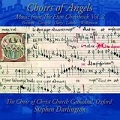 In
the days of LP we had the odd work from the Eton Choirbook, including
Richard Davy’s Passion, which even now is not available
in complete form on CD – excerpts on Naxos – but I don’t
think anyone then would have dreamed that we would have had such a complete
representation now, with five volumes from The Sixteen on Coro and one
each from Gimell and Naxos. Now Avie and Christ Church have doubled
their tally and very fine it sounds, too. Moreover, there’s such
a rich variety of music in the collection that only two of the items
here overlap with the contents of the 5-CD Coro series.
In
the days of LP we had the odd work from the Eton Choirbook, including
Richard Davy’s Passion, which even now is not available
in complete form on CD – excerpts on Naxos – but I don’t
think anyone then would have dreamed that we would have had such a complete
representation now, with five volumes from The Sixteen on Coro and one
each from Gimell and Naxos. Now Avie and Christ Church have doubled
their tally and very fine it sounds, too. Moreover, there’s such
a rich variety of music in the collection that only two of the items
here overlap with the contents of the 5-CD Coro series.
At £2.10 this is excellent value and emusic.com were first and,
as I write, the only contenders in the field with the download; though
the bit-rate of around 240kb/s is not ideal, it’s almost as good
as you are likely to get from amazon.co.uk and iTunes. Classicsonline.com
will be offering it at 320kb/s, but the emusic.com version sounds perfectly
adequate. No doubt it will also be available for streaming from Naxos
Music Library but there’s no need to hesitate to download, especially
at the super-budget price from emusic.com. Only the lack of booklet,
which will presumably be available with the classicsonline.com download,
gives room for reservation.
[As I was transcribing this DL News for the web, yet another recording
of music from the Eton Choirbook dropped on my mat for review: Sony/Deutsche
Harmonia Mundi 88765408852 contains performances by the Huelgas
Ensemble directed by Paul van Nevel of five works from the collection,
including three world premiere recordings by composers whom I hadn't
even heard of before - John Sutton, William Horewud and Edmund Sturton
alongside the more familiar John Browne's Stabat Mater a 6 and
the Robert Wylkynson Salve Regina a 9 included on the Avie album
above. Look out for my review in due course. For those who cannot wait,
I see that 7digital.com
have the download, currently reduced to £4.95.]
Benedetto PALLAVICINO (1551-1601) Madrigali su testi del Guarini
Io disleale? [2:34]
Era l’anima mia [3:52]
Cruda Amarilli; Ma grideran [6:23]
Una farfalla [2:56]
Giovanni Battista dalla GOSTENA (1540-1598) Fantasia XIII [2:00]
Benedetto PALLAVICINO Negatemi pur [1:49]
Cor mio, deh non languire [3:12]
Io mi sento morir [2:45]
Giovanni Antonio TERZI (d. post 1599) Preludio [2:36]
Benedetto PALLAVICINO Occhi un tempo mia vita [3:05]
Ch’io non t’ami [2:37]
Giovanni Antonio TERZI Balletto Alemanno [1:09]
Benedetto PALLAVICINO Ahi, come a un vago sol [3:16]
Giovanni Antonio TERZI Fantasia [4:30]
Benedetto PALLAVICINO Amor, i’ parto [3:56]
T’amo mia vita [2:45]
Giovanni Antonio TERZI Ballo II Alemano [1:10]
Deh, come invan chiedete [3:33]
Felice che vi mira [2:03]
Daltrocanto (Alena Dantcheva, Roberta Giua (soprano); Alessandro Carmignani
(counter-tenor); Gian Paolo Fagotto, Gianluca Ferrarini (tenor); Walter
Testolin (bass); Ugo Nastrucci (lute))/Dario Tabbia – rec. September
2005. DDD
PAN CLASSICS PC10280 [56:20] from eclassical.com
(mp3 and lossless, no booklet) or stream from Naxos Music Library (mp3
with booklet containing texts but no translations)
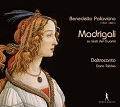 Beautiful
and dignified singing characterised Daltroncanto’s recording of
music from the Staffarda Codex, including Jean Richafort’s Requiem,
though the work was then attributed to another composer, on Opus 111
(no longer available). Although the music here, Pallavicino’s madrigal
settings of Guarini, from the latter part of the sixteenth and early
seventeenth centuries, are almost a century later and in a very different
format, the same epithets will do very nicely for this recording, too.
Beautiful
and dignified singing characterised Daltroncanto’s recording of
music from the Staffarda Codex, including Jean Richafort’s Requiem,
though the work was then attributed to another composer, on Opus 111
(no longer available). Although the music here, Pallavicino’s madrigal
settings of Guarini, from the latter part of the sixteenth and early
seventeenth centuries, are almost a century later and in a very different
format, the same epithets will do very nicely for this recording, too.
Don’t get too excited at discovering the madrigals of a composer
who may well be unfamiliar to you – nothing here is very different
from the style of Monteverdi, and nothing is quite as intense as the
madrigals of Gesualdo which I reviewed last month, but the music has
its own beauty and dignity which brings me full circle back to the words
which I used of Daltrocanto at the beginning. The inclusion of short
instrumental items varies the programme nicely. Quite why we have had
to wait from 2005 to 2013 for this recording is not clear.
From eclassical.com lossless sound comes at the same price as mp3, but
there’s no booklet. Classicsonline.com (mp3 only) and Naxos Music
Library give you the booklet, with the texts, but there are no translations.
Bargain of the Month
John DOWLAND (1563-1626) and others: Time Stands Still
Emma Kirkby (soprano); Anthony Rooley (lute)
Pdf booklet with texts included
HYPERION HELIOS CDH55462 [45:46] – from hyperion-records.co.uk
(mp3 and lossless) [Full details and review in September
2012/1 DL Roundup. For release on CD in August 2013 but available
to download in advance]
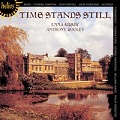 Sheer
delight. This inexpensive Helios reissue (£4.99 for mp3 or lossless)
replaces the full-price CDA66186 which I recommended among a batch of
recordings of music by Dowland and his contemporaries not long ago.
At the new price it’s even more self-recommending. As I had listened
to the earlier release in lossless flac, I tried the mp3 this time round
and it too sounds very well. One small point: theclassicalshop.net and
eclassical.com both allow purchasers of lossless recordings to return
at any time for the mp3 at no extra cost. Hyperion tell me that there
is little demand for this, but, like me, you may disagree. It’s
easy enough for reviewers like myself to come back again but ordinary
purchasers would have to pay again. I understand that Hyperion are prepared
to offer a second download at the same price as their purchase, or lower,
if requested: 'All they have to do is email downloads@hyperion-records.co.uk
and we give it to them FOC.'
Sheer
delight. This inexpensive Helios reissue (£4.99 for mp3 or lossless)
replaces the full-price CDA66186 which I recommended among a batch of
recordings of music by Dowland and his contemporaries not long ago.
At the new price it’s even more self-recommending. As I had listened
to the earlier release in lossless flac, I tried the mp3 this time round
and it too sounds very well. One small point: theclassicalshop.net and
eclassical.com both allow purchasers of lossless recordings to return
at any time for the mp3 at no extra cost. Hyperion tell me that there
is little demand for this, but, like me, you may disagree. It’s
easy enough for reviewers like myself to come back again but ordinary
purchasers would have to pay again. I understand that Hyperion are prepared
to offer a second download at the same price as their purchase, or lower,
if requested: 'All they have to do is email downloads@hyperion-records.co.uk
and we give it to them FOC.'
Marc-Antoine CHARPENTIER (1643-1704)
Judith sive Bethulia liberata (H 391) [41:53]
Cædes Sanctorum Innocentium (H 411) [17:26]
Dagmar Sasková (soprano), Erwin Aros (hautecontre), Jean-François
Novelli (tenor), Arnaud Richard (baritone)
Les Pages, les Chantres and les Symphonistes du Centre de musique baroque
de Versailles/Olivier Schneebeli – rec. live, 5-6 October 2012.
DDD
K617 K617242 [59:19] – from eclassical.com
(mp3 and lossless, no booklet, but see below)
[see review
by Johan van Veen]
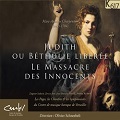 The
lack of a booklet with the download, hence no texts, would be a serious
problem, were it not that it’s available online here.
That’s of limited help, however; even purchasers of the CD have
access only to the original Latin, adapted from the Vulgate, and a French
translation. You will find some help from Kevin R Brine, Elena Ciletti
and Henrike Lähnemann, The Sword of Judith: Judith Studies across
the Disciplines, the free open book edition of Chapter 21, Judith
in Baroque Oratorio – here.
The
lack of a booklet with the download, hence no texts, would be a serious
problem, were it not that it’s available online here.
That’s of limited help, however; even purchasers of the CD have
access only to the original Latin, adapted from the Vulgate, and a French
translation. You will find some help from Kevin R Brine, Elena Ciletti
and Henrike Lähnemann, The Sword of Judith: Judith Studies across
the Disciplines, the free open book edition of Chapter 21, Judith
in Baroque Oratorio – here.
Writers, artists and composers have often been drawn to the story of
Judith narrated in the biblical book of that name and found in the Apocrypha,
from the Old English homilist Ælfric to Mozart. Like Esther, whose
biblical story also became enhanced in the Greek Septuagint translation,
she saved her people from enslavement by beheading the enemy general
Holofernes. Charpentier had a flair for drama, but in general the music
is less animated than you might expect. Olivier Schneebeli and his team
do their best to make the music lively but I see from a photo of the
forces assembled that the chorus – surely larger than Charpentier
would have employed – outnumber the instrumentalists and the latter
sometimes seem swamped in the balance.
The shorter work tells the more familiar story of the Holy Innocents,
slaughtered by Herod in a vain attempt to thwart the rival who, he assumed,
was about to take his throne. Another gruesome story and this time Charpentier
seizes the dramatic possibilities.
The singing throughout is accomplished, the direction and accompaniment
idiomatic, apart from my reservations about the choir vis-à-vis
the orchestra, and the recording good; I enjoyed this release, but with
a slight sense of an opportunity missed. The place to start with Charpentier
would be with the inexpensive Virgin Veritas twofer of his Leçons
de Ténèbres (5220212 – review)
or one of the many recordings of his music directed by Hervé
Niquet on Naxos and Glossa.
Antonio VIVALDI (1678-1741)
Violin concerto in e minor, RV 281 [11:24]
Violin concerto in C, RV 187 [12:51]
Violin concerto in D, RV 232 [12:39]
Violin concerto in F, RV 283 [13:46]
Violin concerto in E flat, RV 254 [14:43]
Violin concerto in d minor, RV 243 [10:25]
Giuliano Carmignola (violin)
Accademia Bizantina/Ottavio Dantone – rec. June 2012, DDD.
DG ARCHIV PRODUKTION 479 1075 [75:48] – from 7digital.com
(mp3)
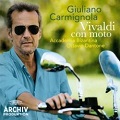 As
Brian Reinhart reports – Recording of the Month:
review
– this is a winner in every respect except for the cover shot of
Giuliano Carmignola in designer shades astride a motor-bike (con
moto – gedit?). It’s a far cry from those restrained covers
that used to grace Archiv LPs, but the performances are also quite different
from the sometimes leaden tempi that once prevailed – these are
lively but not so lively that they become insensitive to the music.
As
Brian Reinhart reports – Recording of the Month:
review
– this is a winner in every respect except for the cover shot of
Giuliano Carmignola in designer shades astride a motor-bike (con
moto – gedit?). It’s a far cry from those restrained covers
that used to grace Archiv LPs, but the performances are also quite different
from the sometimes leaden tempi that once prevailed – these are
lively but not so lively that they become insensitive to the music.
The 7digital.com download comes at 320kb/s but without booklet; for
the same price amazon.co.uk throw in the booklet but their transfer
is at a lower bit-rate. You pays your money … my choice was for
the higher bit-rate, which sounds very good.
Don’t forget Linn’s hi-fi transfer of Carmignola’s earlier
Archiv recording, Concerto Veneziano – Download
News 2012/23 – and another earlier recording from 2006 –
DL
Roundup June 2010.
Jan Dismas ZELENKA (1679-1745) Te Deum, ZWV146 [28:04]
Johann David HEINICHEN (1683-1729) Missa No.9 in D [41:16]
Heiki Hallaschka, Martina Lins-Reuben (soprano), Patrick van Goethem
(alto), Marcus Ullmann (tenor), Jochen Kupfer (bass), Dresden Chamber
Choir
Dresden Baroque Orchestra/Hans-Christoph Rademann – rec. c.2000.
DDD
CARUS 83.148 [73:10] – from
eclassical.com (mp3 and lossless) or stream from Naxos Music Library
(no booklet from either)
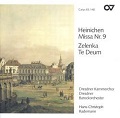 Zelenka
may be the man who composed the mysteriously-named Hipocondrie
but there’s not even a hint of hypochondria or any other ailment
in his lively setting of the Te Deum. The performance is also
lively and it’s well recorded in mp3 and lossless flac.
Zelenka
may be the man who composed the mysteriously-named Hipocondrie
but there’s not even a hint of hypochondria or any other ailment
in his lively setting of the Te Deum. The performance is also
lively and it’s well recorded in mp3 and lossless flac.
If Zelenka is often thought of as the Catholic Bach, Heinichen’s
music frequently bears a considerable resemblance to that of Handel.
I first discovered his music from a 2-CD DG Archiv set, conducted by
Reinhard Goebel, from which a selection was recently reissued at budget
price (479 1110). 7digital.com
have the complete set for £7.49. His Mass No.9 is a ceremonial
affair and receives a suitably grand performance here.
This recording seems to have eluded not only my MusicWeb colleagues
but all other reviewers, so I’m glad to have spotted it and to
recommend it. It’s well worth at least trying from Naxos Music
Library. Only the lack of a booklet presents a problem but both the
Te Deum and the Tridentine Mass texts are readily available online.
Bargain of the Month
 Giovanni
Antonio GUIDO (c.1675-after 1728) Le Quattro Stagioni (The
Four Seasons)
Giovanni
Antonio GUIDO (c.1675-after 1728) Le Quattro Stagioni (The
Four Seasons)
Caroline Balding (violin); The Band of Instruments/Roger Hamilton
DIVINE ART DDA25072 [66:04] – from emusic.com
(mp3, no booklet) or classicsonline.com
or stream from Naxos Music Library (with booklet)
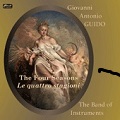 An
entertaining alternative set of concertos on the theme of the four seasons
by a near-contemporary of Vivaldi. It’s never likely to rival the
latter but it’s most enjoyable as presented here. On four tracks,
one for each season, this comes at £1.68 or less from emusic.com.
The bit-rate, around 225kb/s, is short of the ideal but the result is
perfectly acceptable. There’s no booklet, however; to obtain that
and full-cream 320kb/s mp3 you’ll need to pay £7.99 from
classicsonline.com, unless you have access to Naxos Music Library, who
also have the booklet. If you must have lossless sound, that currently
means £10.00 from prestoclassical.co.uk, though it should be available
also from theclassicalshop.net in due course.
An
entertaining alternative set of concertos on the theme of the four seasons
by a near-contemporary of Vivaldi. It’s never likely to rival the
latter but it’s most enjoyable as presented here. On four tracks,
one for each season, this comes at £1.68 or less from emusic.com.
The bit-rate, around 225kb/s, is short of the ideal but the result is
perfectly acceptable. There’s no booklet, however; to obtain that
and full-cream 320kb/s mp3 you’ll need to pay £7.99 from
classicsonline.com, unless you have access to Naxos Music Library, who
also have the booklet. If you must have lossless sound, that currently
means £10.00 from prestoclassical.co.uk, though it should be available
also from theclassicalshop.net in due course.
Strongly recommended
 François
COUPERIN (1688-1733) Trois Leçons de Ténèbres
[18:40 + 12:18 + 12:45]
François
COUPERIN (1688-1733) Trois Leçons de Ténèbres
[18:40 + 12:18 + 12:45]
Marin MARAIS (1656-1728) Tombeau pour Monsieur de Sainte-Colombe*
[7:28]
Chaconne in A* [2:51]
François COUPERIN Motet pour le jour de Pâques
(Easter Motet) [7:29]
M de Sainte-COLOMBE the younger (c.1660-1710) Prelude in e minor*
[5:00]
François COUPERIN Magnificat [12:04]
Susanne Heinrich (viol)*
Carolyn Sampson (soprano), Marianne Beate Kielland (mezzo), Lynda Sayce
(theorbo),
King’s Consort/Robert King (chamber organ) – rec. March 2011.
DDD.
Pdf booklet available
VIVAT 102 [79:40] – from vivatmusic.com
(mp3, 16– and 24-bit lossless)
[‘There is something about the atmosphere of Robert King’s
Ténèbres which makes it more believable than many,
and this is a recording which will take you on a very long journey indeed.’
See review
by Dominy Clements.]
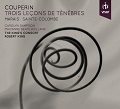 The
King’s Consort’s second recording on their own in-house label
brings us repertoire more predictably akin to their earlier glories
than their first, with music by Stanford and Parry, but it’s equally
welcome.
The
King’s Consort’s second recording on their own in-house label
brings us repertoire more predictably akin to their earlier glories
than their first, with music by Stanford and Parry, but it’s equally
welcome.
Couperin’s setting of the Tenebræ psalms for Wednesday
in Holy Week is suitably dramatic – operatic, even – for an
occasion which was celebrated with great drama in his time, the Matins
for Maundy Thursday being sung by anticipation the previous evening
in a dark church or chapel with the candles extinguished one by one
as the psalms were sung until only one was left to signify the Light
of the World. Hitherto my main recommendation has been for the recording
by Les Arts Florissants and William Christie (Erato, with 4 versets
d’un motet – review)
and that recording is available as a very inexpensive download from
classicsonline.com
at just £2.99, though even at the price a length of 48 minutes
is hardly generous, and there’s no booklet.
My other benchmark for the Ténèbres and Magnificat
is a 1990 Hyperion recording with James Bowman and Michael Chance and
directed by none other than Robert King in an earlier incarnation (CDA66474,
with Lætentur cœli and Venite exultemus Domino:
CD from Archive Service or download in mp3 or lossless, currently discounted
at hyperion-records.co.uk).
This Hyperion recording may not observe Couperin’s instructions
concerning vocal ornamentation, but presents a dramatically convincing
account of the music.
Our Seen and Heard reviewer Ken Carter thought the Wigmore Hall concert
in which the King’s Consort performed these works in the same month
that the recording was made ‘consisted of exquisite music immaculately
performed’ – review
– and that description will do equally well for the recording,
where the performances are every bit as recommendable as those of Les
Arts Florissants. The bonus is that the instrumental playing which he
couldn’t hear at the back of the hall is better balanced on the
very good recording – I tried both the mp3, good value for £8,
and the 24-bit flac, worth the extra at £15, with 16-bit lossless
also available at £10. It’s long past Holy Week and Easter
but I recommend not waiting till next year to buy this recording.
George Frideric HANDEL (1685-1759) Bad Guys
Tamerlano: Vo’ dar pace a un’ alma altiera [4:45]
Ariodante: Spero per voi, si, si [4:06]
Teseo: Voglio stragi, e voglio morte [2:53]
Amadigi di Gaula: Pena tiranna [5:27]
Ariodante: Dover, giustizia, amor [3:51]
Giulio Cesare in Egitto: Belle dèe di questo core
[1:50]
Ottone, re di Germania: D’innalzar i flutti al ciel [4:07];
Bel labbro formato [5:01]
Giulio Cesare in Egitto: Domerò la tua fierezza [3:31]
Teseo: Serenatevi, o luci belle [4:18]
Ariodante: Se l’inganno sortisce felice [4:36]
Amadigi di Gaula: Agitato il cor mi sento [4:03]
Xavier Sabata (counter-tenor)
Il Pomo d’Oro/Riccardo Minasi – rec. August – September
2012.
No notes, texts or translations
APARTÉ AP048 [53:04] – from eclassical.com
(mp3, 16– and 24-bit lossless)
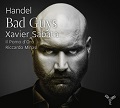 [‘I
became totally engrossed in the repertoire, in admiration for Handel’s
inexhaustible cornucopia of inspiration, and in the performances….
Handel arias are not under-represented in the CD catalogues but most
of these twelve are rarely heard out of context. This disc should be
an ideal addition to all Handelians’ collections.’ See review
by Göran Forsling.]
[‘I
became totally engrossed in the repertoire, in admiration for Handel’s
inexhaustible cornucopia of inspiration, and in the performances….
Handel arias are not under-represented in the CD catalogues but most
of these twelve are rarely heard out of context. This disc should be
an ideal addition to all Handelians’ collections.’ See review
by Göran Forsling.]
In quoting so extensively from Göran Forsling’s review of
the CD, I’ve given the game away, so let me just say that I enjoyed
this considerably. The availability of 24-bit sound for a little extra
cost gives the download an advantage over the CD, but the lack of a
booklet, texts and translations is a serious handicap.
Johann Sebastian BACH (1685-1750)
Violin Concerto No. 1 in a minor, BWV1041 [15:25]
Violin Concerto No. 2 in E, BWV1042 [19:39]
Violin Concerto in D, BWV1053 (arr. from harpsichord No. 2 in E) [12:17]
Concerto for Violin and Harpsichord in c minor, BWV1060* (arr. from
Concerto for Violin and Oboe/Concerto for two harpsichords) [13:05]
Ottavio Dantone (harpsichord)*
Accademia Bizantina/Viktoria Mullova (violin)
ONYX4114 [60:26] – from eclassical.com
(mp3 and lossless)
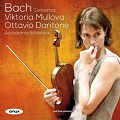 It’s
only a few weeks since I was recommending two outstandingly good recordings
of the Bach Violin Concertos:
It’s
only a few weeks since I was recommending two outstandingly good recordings
of the Bach Violin Concertos:
• Double and Triple Concertos, BWV1043, 1044, 1060R and 1064R:
Brecon Baroque with Rachel Podger and others, Channel Classics CCSSA34113;
Recording of the Month – DL
News 2013/7
• Solo, Double and Triple Concertos, BWV1041, 1042, 1043 and 1064R,
Harmonia Mundi HMC902145: Recording of the Month
– DL
News 2013/6
and reminding readers of the virtues of:
• BWV1041, 1042, 1056 and 1056 Rachel Podger, Channel Classics
CCSSA27208 – November 2011/1 DL Roundup and DL
News 2013/7
• Concertos avec plusieurs instruments: ALPHA811
(6 CDs) – DL
News 2013/6
to which I could and should have added:
• BWV1041, 1042, 1043 and 1060: BIS-CD-961 Soloists; Bach
Collegium Japan/Masaaki Suzuki – mp3 and lossless, with pdf booklet,
from eclassical.com.
Now along come Viktoria Mullova and her team to complicate the issue
by offering another highly recommendable recording but with yet a different
and unusual combination of concertos, with BWV1060, extant only as a
concerto for two keyboards, arranged not, as usual, for violin and oboe
but for violin and harpsichord. I enjoyed all the listed recordings,
including the new Onyx, as supplements to the Teldec/Warner Complete
Bach on USB. You won’t go wrong with any of them– simply choose
your preferred coupling.
Strongly recommended
 Johann
Sebastian BACH (1685-1750)
Johann
Sebastian BACH (1685-1750)
Clavierübung III
Stephen Farr (Metzler Organ, Trinity College, Cambridge) – rec.
3-4 April, 2013. DDD
Pdf booklet includes chorale texts and full organ specification
RESONUS RES10120 [105:08] – from resonusclassics.com
(mp3, aac and lossless)
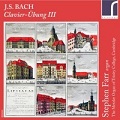 This
recording earned my Recording of the Month accolade in
2013/8 and I’m pleased to see that Geoff Molyneux has also greatly
enjoyed hearing it:
This
recording earned my Recording of the Month accolade in
2013/8 and I’m pleased to see that Geoff Molyneux has also greatly
enjoyed hearing it:
This great collection of music composed specifically for the organ is
one of Bach’s finest achievements. The collection is framed by
a magnificent Prelude and Fugue and Stephen Farr sets a magisterial
tone at the outset in the huge opening Praeludium, which combines
French overture and Italian concerto style.
In the ensuing group of chorale settings in contrapuntal style, Stephen
Farr treats us to a wide variety of imaginative colouring which is both
attractive in itself and which also enhances the structure of the music
and at the same time allows us to hear the individual parts with great
clarity. Some of these pieces are in lighter vein, giving the listener
a little respite from the complexity of the first few pieces. Although
Bach had been criticised for his use of old-fashioned compositional
techniques, we can hear him dabbling with the newer and more tuneful
style galant, albeit in a tentative way. Bach can rarely allow
his intellect a moment’s rest.
The beauty of Farr’s playing can be readily discerned in BWV 678,
a piece of seeming simplicity but with ever increasing counterpoint
around the main theme, and this is followed by the bouncily played BWV
679, vividly contrasting in registration. BWV 686 is one of the most
contrapuntally complex pieces in the collection. Stephen Farr gives
a magnificent performance with great clarity in the part writing but
he also builds this famous work to a glorious and emotionally exhausting
climax.
The final group of four duets almost give a feeling of light-heartedness
after so much complex counterpoint. But things are not so simple and
there is always an undercurrent of mystery as well as unexpected twists
of harmony and chromaticism. Farr as always gives first class performances.
Unlike Clavier-Übung IV and the Goldberg Variations,
these pieces were probably not intended to be heard continuously in
sequence. However you would not know this from Stephen Farr’s performance.
Due to his in-depth understanding of this great music he presents us
with a performance that is totally satisfying as a complete structure.
He achieves this with well chosen tempi, and use of well-contrasted
registrations and colouring. This is the most enjoyable performance
of Bach’s Clavier-Übung I can ever remember hearing.
It is magnificently recorded and Stephen Farr makes full use of the
colours available from the Metzler Organ of Trinity College, Cambridge.
All in all this is a must-buy recording and one I shall return to again
and again.
Geoffrey Molyneux
Wolfgang Amadeus MOZART (1756-1791)
Piano Concerto No.17 in G, K453 [30:10]
Piano Concerto No.27 in B flat, K595 [29:09]
Angela Hewitt (piano)
Orchestra da Camera di Mantova/Hannu Lintu – rec. July 2011. DDD
Pdf booklet included
HYPERION CDA67919 [59:19] – from hyperion-records.co.uk
(mp3, 16– and 24-bit lossless) [see also DL
News 2013/8]
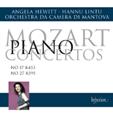 The
first thing we notice on hearing the beginning of K453 is the lightness
and gentle delicacy of the orchestral playing. This approach sets the
tone for the performance as a whole and admirably suits those same qualities
exemplified in Angela Hewitt’s playing. There is great subtlety
of expression in the performance with every detail in Mozart’s
score meticulously observed. The players also demonstrate real imagination
in realising the expressive possibilities of Mozart’s sound-world.
Every turn of phrase seems to have been carefully rehearsed and prepared.
The performance can seem a little contrived; certainly it does not have
any feeling of spontaneity, but every corner brings a new delight in
articulation, balance and expression. There are one or two very minor
niggles for me such as a couple of semibreves in the violins in K453
first movement with an unnecessary swelling in volume, overdone and
a touch irritating.
The
first thing we notice on hearing the beginning of K453 is the lightness
and gentle delicacy of the orchestral playing. This approach sets the
tone for the performance as a whole and admirably suits those same qualities
exemplified in Angela Hewitt’s playing. There is great subtlety
of expression in the performance with every detail in Mozart’s
score meticulously observed. The players also demonstrate real imagination
in realising the expressive possibilities of Mozart’s sound-world.
Every turn of phrase seems to have been carefully rehearsed and prepared.
The performance can seem a little contrived; certainly it does not have
any feeling of spontaneity, but every corner brings a new delight in
articulation, balance and expression. There are one or two very minor
niggles for me such as a couple of semibreves in the violins in K453
first movement with an unnecessary swelling in volume, overdone and
a touch irritating.
The performance of K453 really comes into its own in the second movement
Andante. There is some really touching and affecting playing
here as the music moves in curious ways passing through unexpected keys.
There are dramatic and dark brooding moments such as the piano entry
in G minor, a passage well-realised by Hewitt. The Allegretto
which follows is a set of 5 variations and a coda, designated Finale
Presto. Mozart’s use here of variations for a finale anticipates
two great works still to come, the Piano Concerto K491 and the Clarinet
Quintet. Angela Hewitt demonstrates her virtuosity in the second variation
of K453 where the fast triplet quavers are executed with great clarity.
In the third variation, we hear beautiful toned and exquisite playing
from the flute, oboe and bassoon players from Mantua. The ensuing Presto
is played with appropriate wit and panache.
Brendel plays K453 with equal delicacy on an old Vox recording but his
orchestra, especially the wind soloists are no match for the Mantuan
players here. Hewitt and her band play the second movement at a true
Andante tempo as requested by Mozart. Brendel seems to want to
pull his orchestra back whenever he can. Rudolf Buchbinder gives a fine
performance with the Vienna Symphony Orchestra on Profil but the Hyperion
beats it in terms of performance and recording clarity.
Once again, the performance of K595 is characterised by lightness of
touch and clarity of texture. I like the way melodies are given equal
importance in the recording whether played by the wind soloists or strings
of the orchestra, or by the piano soloist. The piano in a sense becomes
just one part in the overall texture and structure of the music and
this seems to be how these players view this work. I prefer this performance
to the recording by Pierre-Laurent Aimard on Warner Classics. As well
as charm, Hewitt seems rather more stylish with a firm sense of direction.
Her orchestra has greater rhythmic bite and attack in the sforzandi
accents, and they make more vivid and telling contrasts in the marked
dynamics than does the Chamber Orchestra of Europe. In Angela Hewitt’s
admirable programme notes she states that the second movement Larghetto
should not be taken too slowly and her interpretation convinces me of
this. She is nearly two minutes quicker than Aimard and she takes one
and a half minutes off Clifford Curzon’s performance time with
Rafael Kubelík.
Hewitt and her players find such a variety of emotions in these concertos,
from simplicity and charm to sadness and melancholy, and there is always
a true feeling of ensemble playing. This is a very fine release and
the recording quality is up to Hyperion’s usual high standards.
Geoffrey Molyneux
[NB: most of the comparisons mentioned can be accessed from Naxos Music
Library. BW]
Paul WRANITZKY (1756-1808) String Trios
Trio in E flat, Op.17/2 [19:48]
Trio in F, Op.3/1 [17:15]
Trio in G, Op.3/3 [18:58]
Ensemble Cordia (Stanley Ritchie (violin), Stefano Marcocchi (viola),
Stefano Veggetti (cello)) – rec. 2 – 4 September 2010, Eroica-Saal,
Palais Lobkowitz, Vienna, Austria. DDD
BRILLIANT CLASSICS 94339 [56:02] – from emusic.com
(mp3)
[see review
by Johan van Veen.]
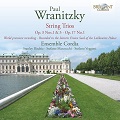 The
catalogue is not exactly over-burdened with music by Wranitzky, also
known by his Czech name Pavel Vranický and this recording of
three of his string trios is welcome and enjoyable. I share Johan van
Veen’s reservations about the over-resonant recording venue –
it may be an important hall with lots of history, but it’s surely
too large for this repertoire – and the timing is not over-generous,
but, with good performances, this recent Brilliant Classics release
is more than a historical curiosity. The transfer is made at around
220kb/s – not ideal but adequate.
The
catalogue is not exactly over-burdened with music by Wranitzky, also
known by his Czech name Pavel Vranický and this recording of
three of his string trios is welcome and enjoyable. I share Johan van
Veen’s reservations about the over-resonant recording venue –
it may be an important hall with lots of history, but it’s surely
too large for this repertoire – and the timing is not over-generous,
but, with good performances, this recent Brilliant Classics release
is more than a historical curiosity. The transfer is made at around
220kb/s – not ideal but adequate.
The CD comes at budget price, but the download from emusic.com is even
slightly less expensive (£4.62 or less). There’s an even
less expensive Supraphon/Panton recording of the String Quartets, Op.16/1-3,
performed by the Stamic Quartet, from the same source – just three
tracks, 57 minutes, for £1.26 or less: download here.
Classicsonline.com have another Brilliant Classics recording of Wranitzky
from the Cordia Ensemble, containing a String Quintet and a String Sextet
(94186), but, at £7.99, that’s more expensive than
the CD, though you may wish to stream it from Naxos Music Library (with
booklet).
Chandos have a recording of Wranitzky symphonies in their Contemporaries
of Mozart series – available separately (CHAN9916)
or as part of a 5-CD package (CHAN10628X
– see September
2010 DL Roundup). The even more generous USB collections, CHUSB001
and CHUSB002 which I reviewed in May
2011 are no longer available but that doesn’t qualify my recommendation
of the whole series, apart from the mis-labelling of some of the tracks
of the Wranitzky which I mentioned.
Strongly recommended
Ludwig van BEETHOVEN (1770-1827) Quartets, Opus 18, volume 1
 Quartet
in D, Op.18/3 [24:24]
Quartet
in D, Op.18/3 [24:24]
Quartet in c minor, Op.18/4 [25:59]
Quartet in A, Op.18/5 [28:06]
Allegri String Quartet – rec. April 2012. DDD.
Pdf booklet available
VIVAT 103 [78:29] – from vivatmusic.com
(mp3, 16/44.1, 24/96 and 24/192 lossless)
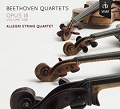 This
is the first recording on the new Vivat label not to feature the King’s
Consort. While it’s easy to assume that anything that the Consort
produce is going to be first-class, any new recording of the Beethoven
Quartets, especially one which announces itself as heralding a series,
needs to be very good indeed even to match the current incumbents, let
alone excel them. That’s especially true for the late quartets,
but even Beethoven’s first set, Op.18, were ground-breaking in
their time and the challenge for any performers is to show how the hints
of the later, tougher style are present without compromising the freshness
of the music. Even a rather good set from the Wihan Quartet on Nimbus
(NI6105, 2 CDs) didn’t quite make the grade for me –
review.
This
is the first recording on the new Vivat label not to feature the King’s
Consort. While it’s easy to assume that anything that the Consort
produce is going to be first-class, any new recording of the Beethoven
Quartets, especially one which announces itself as heralding a series,
needs to be very good indeed even to match the current incumbents, let
alone excel them. That’s especially true for the late quartets,
but even Beethoven’s first set, Op.18, were ground-breaking in
their time and the challenge for any performers is to show how the hints
of the later, tougher style are present without compromising the freshness
of the music. Even a rather good set from the Wihan Quartet on Nimbus
(NI6105, 2 CDs) didn’t quite make the grade for me –
review.
Grace and intensity, then, are the qualities I was looking for and,
oddly enough, the adjectives associated with those words are to be found
in the first review of this Vivat release which I have seen, qualities
which you’ll find in my benchmark recordings:
• Decca 470 8482 (2 CDs, Op.18/1-6) Takács Quartet
– download from 7digital.com
(mp3) or deutschegrammophon.com
(mp3 and lossless)
• Philips Originals E475 8252 (3 CDs, Op./1-6) Quartetto
Italiano – download only from 7digital.com
(mp3) or deutschegrammophon.com
(mp3 and lossless)
In the event, I didn’t have to make detailed comparisons; the new
recordings are good enough to stand in their own right. I understand
that a decision was taken at the outset to get up close and personal
with the Allegris, relying on the quality of their playing, a decision
which seems eminently logical given the distinguished half-century history
of the quartet and is well borne out in the result. Of course, the personnel
have changed over the years, but change has been gradual and organic
and the quality has remained high, with some very distinguished high
points indeed along the way. The oldest representation of the quartet
in the current catalogue is on the EMI recording of Elgar with Barbirolli
at the helm, on which they perform with great distinction in the Introduction
and Allegro – one of my desert island discs (EMI Masters 0851872).
That decision about the recording set-up has paid dividends in terms
of the immediacy of the sound, especially as heard in 24-bit format,
with even the mp3 sounding very satisfactory. Those older rival recordings
are less expensive, about the same price for a 2-CD set as for the single
Vivat release, but neither of them comes in 24-bit sound and, on a sliding
scale from £8 for mp3 to £15 for both 96kHz and 192kHz,
the new version is not at all unreasonable in price. I had a problem
with one track in 24/96 format but that track sounds fine in the other
formats and the 24/96b problem has now been solved, too.
Antonín (Anton, Antoine) REICHA (1770-1836) Complete String
Quartets, Volume One
String Quartet in C, Op. 48/1 [31:48]
String Quartet in G, Op. 48/2 [31:27]
Kreutzer Quartet – rec. February 2013. DDD.
First Recordings
Pdf booklet included
TOCCATA CLASSICS TOCC0022 [64:46] – from toccataclassics.com
(mp3 and lossless) or stream from Naxos Music Library
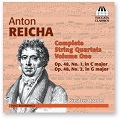 Antonín
Reicha was an exact contemporary and friend of Beethoven; though his
music is hardly to be reckoned on a par with that of his more famous
contemporary, it certainly doesn’t deserve the neglect from which
it has suffered. As always, Toccata have done sterling service by making
us aware of the injustice; though his chamber music for wind has been
recorded, only one string quartet from his output was previously available.
It says ‘Volume One’ on the cover and I look forward to the
pleasure of hearing more music, performance and recording of this quality.
Antonín
Reicha was an exact contemporary and friend of Beethoven; though his
music is hardly to be reckoned on a par with that of his more famous
contemporary, it certainly doesn’t deserve the neglect from which
it has suffered. As always, Toccata have done sterling service by making
us aware of the injustice; though his chamber music for wind has been
recorded, only one string quartet from his output was previously available.
It says ‘Volume One’ on the cover and I look forward to the
pleasure of hearing more music, performance and recording of this quality.
Franz SCHUBERT (1797-1828)
Symphony No.6 in C ‘Little C major’ [30:30]
Rosamunde Incidental Music [32:12]
Swedish Chamber Orchestra/Thomas Dausgaard – rec. February 2012.
DDD/DSD
Pdf booklet included
BIS BIS-SACD-1987 [62:42] – from eclassical.com
(mp3, 16– and 24-bit lossless)
Symphony No. 8 in b minor, D759 ‘Unfinished’ [20:17]
Symphony No. 9 in C, D944 ‘The Great’ [57:34]
Swedish Chamber Orchestra/Thomas Dausgaard – rec. October 2006.
DDD/DSD
Pdf booklet included
BIS BIS-SACD-1656 [77:51] – from eclassical.com
(mp3, 16– and 24-bit lossless)
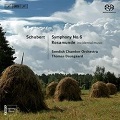 The
‘little’ C major symphony and the Rosamunde music respond
well to the Opening Doors chamber orchestra treatment – this is
the scale at which Schubert probably heard these works. I’d be
welcoming the new recording with open arms, especially as 24-bit is
on offer for the same price as mp3 and 16-bit at the time of writing,
but the Beecham recording, now coupled on EMI with Nos. 3 and 5 (download
only: £4.99 from classicsonline.com)
or as part of an inexpensive 8-CD set (9186112), still takes
a great deal of beating.
The
‘little’ C major symphony and the Rosamunde music respond
well to the Opening Doors chamber orchestra treatment – this is
the scale at which Schubert probably heard these works. I’d be
welcoming the new recording with open arms, especially as 24-bit is
on offer for the same price as mp3 and 16-bit at the time of writing,
but the Beecham recording, now coupled on EMI with Nos. 3 and 5 (download
only: £4.99 from classicsonline.com)
or as part of an inexpensive 8-CD set (9186112), still takes
a great deal of beating.
Of course the new BIS recording is preferable sound-wise, especially
for fans of SACD or 24/96 sound, but the EMI doesn’t sound at all
bad for its age and it remains my preferred choice; by comparison, paradoxically,
despite the small-scale forces and some really delicate playing at times,
Dausgaard makes the work sound bigger-boned. It’s not just a matter
of tempi – Dausgaard is actually mostly faster than Beecham, though
his timings seem longer on paper because he observes repeats.
It’s a shame that BIS didn’t include the Rosamunde
Overture even though it was originally intended for another work, Die
Zauberharfe and pressed into service for Rosamunde; there
would have been room for it. That said, however, the performance captures
the essence of the music and the recording throughout is very good.
The competitive eclassical.com price – charged per second –
takes care of the slightly short playing time.
If, for any reason, neither Beecham nor Dausgaard is your cup of tea,
Claudio Abbado and the Chamber Orchestra of Europe pair symphonies 5
and 6 on a DG CD, performances on much the same scale as on BIS, or
there’s the complete set of Schubert Symphonies plus the orchestrated
Grand Duo by these performers in a 5-disc DG box, excellent value
from 7digital.com
for just £11.99: Bargain of the Month – review.
The earlier BIS recording of Nos. 8 and 9 is on offer at a discount
to celebrate the new version of No.6 – it probably won’t be
by the time that you read this, but BIS have regular offers of this
kind on eclassical.com, well worth looking out for. If you’re used
to a really slow tempo for the opening movement of the Unfinished, be
prepared for Dausgaard to open your eyes to something much faster. Most
conductors take this movement too slowly – almost andante
rather than allegro moderato – so that we end up with two
slowish movements, the second of which becomes almost adagio
rather than andante con moto in order to differentiate between
them. In Dausgaard’s interpretation Schubert’s markings are
adhered to – there’s a real sense of onward momentum, as per
the con moto indication, in the second movement, too. For comparison,
Abbado, whose Schubert I like, takes 14:58 and 11:30 for the two movements
as against Dausgaard’s 11:02 and 9:15. I thoroughly approve, but
try first from Naxos Music Library if you are in doubt. For the Abbado
see September
2010 DL Roundup – ignore the defunct passionato.com link: purchase
from deutschegrammophon.com
(mp3 or lossless) or go for the 5-CD set from the same source –
here
– in mp3 or lossless (or from 7digital.com in mp3 – see above).
Tempi in the Great C major are also fast, but only marginally
faster than, for example, Sir Charles Mackerras with the Philharmonia
on Signum or his earlier version with the OAE on Virgin, two other recordings
which I like, the latter coupled with No.5 and the Newbould completion
of No.8 at budget price.
Robert SCHUMANN (1810-1856) Piano Concerto in a minor, Op.54*
[31:34]
Antonín DVOŘÁK (1841-1904) Piano
Concerto in g minor, Op.33 (1876, Original published version, 1883)
[38:55]
Francesco Piemontesi (piano)
BBC Symphony Orchestra/Jiří Bělohlávek – rec. (live*),
November and December 2012. DDD
Pdf booklet included.
NAÏVE V5327 [70:29] – from eclassical.com
(mp3 and lossless)
Antonín DVOŘÁK (1841-1904)
Piano Concerto in g minor, Op. 33 (B63) (1876) [39:20]
Violin Concerto in a minor, Op. 53 (B96) (1879, revised 1882-83) [31:04]
Rustem Hayroudinoff (piano)
James Ehnes (violin)
BBC Philharmonic Orchestra/Gianandrea Noseda – rec. 2004. DDD
CHANDOS CHAN10309 [70:29] – from theclassicalshop.net
(mp3, 16– and 24-bit lossless)
[‘These are well performed recordings from Chandos that do not
disappoint even if they are not my preferred version of each work.’
See review
by Michael Cookson.]
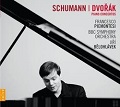 Naïve:
The Dvořák Piano Concerto, once something of an orphan, has now
been recorded several times, but this is, I believe, the only one to
be coupled with the more popular Schumann; moreover, it’s a performance
of the original (1883) version.
Naïve:
The Dvořák Piano Concerto, once something of an orphan, has now
been recorded several times, but this is, I believe, the only one to
be coupled with the more popular Schumann; moreover, it’s a performance
of the original (1883) version.
The prevailing mood in both performances is much lighter and more lyrical
than usual. Though there’s plenty of power in the opening bars
of the Schumann, that power soon yields to a more pensive mood and the
two continue to be combined throughout the performance, with a lyrical
slow movement and a free-wheeling finale. This is not one for those
looking for the usual warhorse and it wouldn’t be my top recommendation
if you just want one version in your library – that would probably
be Leif-Ove Andsnes (EMI) or Stephen Bishop (Philips*), both coupled
with the usual Grieg and at mid price – but all concerned make
it work well.
* download only at present, from amazon.co.uk.
Surely destined to return on CD?
The recording sounds very well in mp3 and even better in lossless flac
– both at the same price and available for repeat downloads, so
that you can have the flac for your home system and mp3 for your personal
player. With the mp3 there’s the usual brief hiatus where the music
is continuous between the second and third movements of the Schumann.
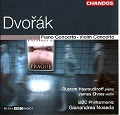 On
Chandos we are offered a combination of the original score of
the Piano Concerto and the ‘playing version’ which once held
sole sway, so the two performances are not strictly comparable. If you
don’t have a recording of the better-known Violin Concerto, perhaps
from Suk on Supraphon, or don’t wish to have the Schumann coupling,
this is an excellent alternative.
On
Chandos we are offered a combination of the original score of
the Piano Concerto and the ‘playing version’ which once held
sole sway, so the two performances are not strictly comparable. If you
don’t have a recording of the better-known Violin Concerto, perhaps
from Suk on Supraphon, or don’t wish to have the Schumann coupling,
this is an excellent alternative.
One other version of the Dvořák Piano Concerto to bear in mind:
Pierre-Laurent Aimard (piano); Concertgebouw/Nicolaus Harnoncourt (Warner)
– see March
2009 DL Roundup.
Bargain of the Month
 Richard
WAGNER (1813-1883)
Richard
WAGNER (1813-1883)
100x Wagner, den man gehört haben muß
EMI 5099974197750 [7:53:05] – from classicsonline.com
(mp3) or stream from Naxos Music Library
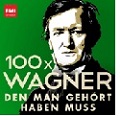 I
know there are lovers of good singing out there who restrict themselves
to recital recordings and don’t even wish to dip a toe into single
CDs of opera excerpts, let alone venture out and purchase the complete
Decca Solti Ring or Warner’s complete Barenboim Wagner opera
set. Perhaps some of them will be more tempted after hearing Barenboim’s
complete Ring from the BBC Proms this year to go for his blu-ray
set, on offer for around £40, but for the determined recital-only
fans, this 6-CD set, with almost 8 hours of music for £4.99, has
to be the bargain of the Wagner bi-centenary year. The list of mainly
distinguished performers is too long to include here but you’ll
find it on the classicsonline.com website. There are no duds anywhere.
I
know there are lovers of good singing out there who restrict themselves
to recital recordings and don’t even wish to dip a toe into single
CDs of opera excerpts, let alone venture out and purchase the complete
Decca Solti Ring or Warner’s complete Barenboim Wagner opera
set. Perhaps some of them will be more tempted after hearing Barenboim’s
complete Ring from the BBC Proms this year to go for his blu-ray
set, on offer for around £40, but for the determined recital-only
fans, this 6-CD set, with almost 8 hours of music for £4.99, has
to be the bargain of the Wagner bi-centenary year. The list of mainly
distinguished performers is too long to include here but you’ll
find it on the classicsonline.com website. There are no duds anywhere.
If you don’t like the German cover, there’s an English language
version from the same source for £6.99 – the same material,
slightly more tidily arranged, opera by opera, whereas the German starts
with the most famous orchestral bleeding chunks.
Much less recommendable: The Colón Ring: Wagner in Buenos
Aires, a film by Hans Christoph von Bock (C Major DVD 712808
or blu-ray 712904) is not exactly what you may think. It’s
not what I expected; it deals with all the vicissitudes of mounting
a 7-hour reduction of the Ring cycle in Buenos Aires in November 2012,
interesting enough for one viewing but hardly something that you’re
likely to wish to return to. What snippets we do see of the final production
are fair enough – the usual gimmicks that one expects nowadays,
such as Alberich carrying off a doll to represent the ring, coupled
with mostly very accomplished singers having trouble to remember where
the cuts occur. Save your £18 (DVD) or £28 (blu-ray) towards
the complete recording on 713008 (DVD) or 713104 (blu-ray),
available for around £87, or, better still, towards the £40
asking price for the Barenboim blu-ray set.
Recommended recording
 Giuseppe
VERDI (1813-1901)
Giuseppe
VERDI (1813-1901)
Rigoletto
Renata Scotto, Fiorenza Cossotto, Carlo Bergonzi, Dietrich Fischer-Dieskau,
Ivo Vinco
Coro e Orchestra del Teatro alla Scala/Rafael Kubelík
DG Opera House 477 5608 [122:36] – from 7digital.com
(mp3)
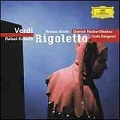 The
Verdi bi-centenary year is half way through and I haven’t yet recommended
a version of something as basic as Rigoletto. With no consensus
as to the top choice*, I listened again to an earlier CD release of
this recording, available again at budget price on CD or as a download
and it’s still very competitive, not least for Fischer-Dieskau
as a not-over-the-top Rigoletto. You may associate Kubelík more
with the German repertoire and Dvořák, but he was an accomplished
opera conductor. I can’t vouch for this download but it comes at
the full 320kb/s so should be more than acceptable. The balance favours
the voices, which is better than obscuring them. There’s no libretto
– I presume that, at the price, there’s none with the latest
CD reissue, as is the case with my own set – but that’s easily
found online.
The
Verdi bi-centenary year is half way through and I haven’t yet recommended
a version of something as basic as Rigoletto. With no consensus
as to the top choice*, I listened again to an earlier CD release of
this recording, available again at budget price on CD or as a download
and it’s still very competitive, not least for Fischer-Dieskau
as a not-over-the-top Rigoletto. You may associate Kubelík more
with the German repertoire and Dvořák, but he was an accomplished
opera conductor. I can’t vouch for this download but it comes at
the full 320kb/s so should be more than acceptable. The balance favours
the voices, which is better than obscuring them. There’s no libretto
– I presume that, at the price, there’s none with the latest
CD reissue, as is the case with my own set – but that’s easily
found online.
Fans of Maria Callas and Tito Gobbi will find the latest reissue of
their recording with Tullio Serafin conducting (EMI) for £6.99
from classicsonline.com.
Oddly, the single-CD highlights recording costs exactly the same.
* James Levine (DG) and Richard Bonynge (Decca), both with Luciano Pavarotti,
have strong advocates; both are available as downloads from 7digital.com
in mp3 for £11.99 and for a little more in lossless flac from
deutschegrammophon.com.
Two other Verdi recommendations based on ownership of the CD sets in
earlier incarnations:
• Don Carlo (Italian version): Plácido Domingo, Monserrat
Caballé, Ruggero Raimondi; Ambrosian Opera Chorus; Covent Garden
Orchestra/Carlo Maria Giulini (EMI) – from classicsonline.com
(mp3) (£7.99)
• Macbeth: Plácido Domingo, Nicolai Ghiaurov, Shirley
Verrett, Piero Cappucilli; la Scala Chorus and Orchestra/Claudio Abbado
(DG Originals) – from 7digital.com
(mp3) (£9.99)
Again, I can’t vouch for the downloads but they both come at 320kb/s
from reliable sources. Amazon.co.uk have the 14-CD Collectors Edition
of six Verdi operas from la Scala and conducted by Abbado for £29.99
– here.
That’s also available in mp3 and lossless flac from deutschegrammophon.com.
Karl GOLDMARK (1830-1915)
‘Rustic Wedding’ Symphony, Op. 26 (1875) [43:46]
Symphony No. 2 in E flat major, Op. 35 (1887) [31:45]
Singapore Symphony Orchestra/Lan Shui
rec. Esplanade Concert Hall, Singapore, August 2009 (Rustic Wedding),
July/August 2011 (No. 2)
BIS-SACD-1842 [76:22] – from eclassical.com
(mp3, lossless 16– & 24-bit flacs)
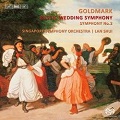 In
my 2010 review of Lan Shui and the Singapore Symphony’s Seascapes
I noted that BIS were on a roll. Three years on and this collaboration
is even stronger; take their fine Rachmaninov Piano Concerto No. 1 and
First Symphony (review)
and the Third Symphony and Rhapsody on a theme of Paganini, both
of which are made even more desirable by the electric talents of pianist
Yevgeny Sudbin. The BIS team certainly make the most of Singapore’s
Esplanade Concert Hall, whose lovely, seductive acoustic would be most
welcome in place of our less congenial RFH and Barbican.
In
my 2010 review of Lan Shui and the Singapore Symphony’s Seascapes
I noted that BIS were on a roll. Three years on and this collaboration
is even stronger; take their fine Rachmaninov Piano Concerto No. 1 and
First Symphony (review)
and the Third Symphony and Rhapsody on a theme of Paganini, both
of which are made even more desirable by the electric talents of pianist
Yevgeny Sudbin. The BIS team certainly make the most of Singapore’s
Esplanade Concert Hall, whose lovely, seductive acoustic would be most
welcome in place of our less congenial RFH and Barbican.
The ‘Rustic Wedding’ Symphony is probably Goldmark’s
best-known work alongside his Violin Concerto No. 1. Both can be heard
on an EMI twofer from André Previn and the Pittsburgh Symphony,
which includes Sarah Chang in that Violin Concerto and Janos Starker
in the rarely heard Konzerstück for Cello and Orchestra.
There are other recordings of ‘Rustic Wedding’ – Beecham’s
and Bernstein’s among them – but there’s only one other
version of the Symphony No. 2, on the Marco Polo label.
The Hochzeitsmarsch begins with a gentle, rocking theme on cellos
and basses, and that’s followed by 13 charming and very danceable
variations. Even at this early stage the Singapore band sound remarkably
cultured – very European, as a friend and fellow critic remarked
after hearing this new recording. Previn can usually be relied upon
to spring rhythms most naturally – and so he does – but EMI’s
upfront and somewhat coarse recording is a real turn-off after the warmth
and naturalness of this new rival. Previn is a touch more colourful,
but for sheer lilt and loveliness the Singaporeans are hard to beat.
The Pittsburghers deliver a sometimes too emphatic Brautlied,
whereas Shui’s forces – the beautifully blended horns in particular
– are pliant and tender. The two oboes at the start of the Serenade
are characterful in both versions, and Previn points the music very
well, but the latter is found wanting when it comes to warmth and ‘air’.
A much-vaunted recording in the early digital age, EMI’s ‘Rustic
Wedding’ – like so much of its catalogue – has been crudely
transferred, and that alone puts it out of contention. Lan Shui’s
Im Garten is radiantly done – the strings are just gorgeous
– and the buoyant Tanz is a joy from start to finish.
Symphony No. 2 may have many of the gentle cadences of its predecessor
but it’s an altogether more robust and rigorously argued work.
Goldmark’s close attention to detail and colour are underscored
by a fine recording, which goes some way towards alleviating the occasional
longueurs. That said, tuttis are never overbearing and Shui makes
the most of the symphony’s more dramatic turns.
The often sonorous Andante is a splendid affair – there’s
some terrific brass playing here – and one has to marvel at the
oaken glow of this orchestra; such a sophisticated sound isn’t
acquired overnight, and it speaks volumes for Shui’s continuing
tutelage. Despite the nimble Presto-Trio – the woodwind
are gleefully precise – and a crisply despatched finale I must
confess this vaguely Brahmsian effort isn’t very compelling. That
said, your options are somewhat limited where this piece is concerned.
I suspect ‘Rustic Wedding’ is the draw here, so unless you
have a burning desire to try the later work I’d suggest you stick
with the earlier one; it really is a gem, and I doubt you’ll hear
it more affectionately played – or better recorded – than
it is here. Decent liner-notes complete the competitively priced package;
indeed, when I reviewed this download it was being offered at a discount
as part of eclassical’s regular weekly deals.
Dan Morgan
http://twitter.com/mahlerei
[I hardly expected this new recording of the utterly charming Rustic
Wedding to rival the classic Thomas Beecham which I recommended
in a very decent transfer from Beulah in August
2012/1 DL Roundup (13-17BX43). In the event, though I did
play the Beecham again, I didn’t need to make detailed comparisons
because the new version, though it may lack the very last degree of
the Beecham touch, which no living mortal could be expected to equal,
is very enjoyable indeed. The recording, too, is extremely good–
for the benefit of those intending to listen to the flac on their main
audio system and the mp3 on their personal player, I can confirm that
the latter, too, is very good of its kind, even when played via the
USB input on my audio. Remember that eclassical.com, like theclassicalshop.net,
allow purchasers to return at any time to retrieve a version of any
purchase at or below the original asking price. BW]
Antonín DVOŘÁK (1841-1904)
Symphony No.9, Op.95 (from the New World) [43:43]
A Hero’s Song, Op.111, B119 [20:13]
Bavarian Radio Symphony Orchestra/Andris Nelsons – rec. 2010 and
2012. DDD
BR KLASSIK 900116 [64:17] – from emusic.com
(mp3, no booklet) or classicsonline.com
(mp3, with booklet) or stream from Naxos Music Library
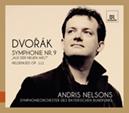 I
may have more recordings of the New World Symphony than you can
shake a stick at, with Rafael Kubelík and the BPO (DG Originals)
and Iván Fischer with the Budapest Festival Orchestra (Channel
Classics) still firm favourites, but I couldn’t resist listening
to what another reviewer (not MusicWeb International) had made Recording
of the Month (all categories), especially as I’ve appreciated the
recordings which I’ve heard to date by Andris Nelsons. The inclusion
of the little-known tone poem as coupling was an added incentive.
I
may have more recordings of the New World Symphony than you can
shake a stick at, with Rafael Kubelík and the BPO (DG Originals)
and Iván Fischer with the Budapest Festival Orchestra (Channel
Classics) still firm favourites, but I couldn’t resist listening
to what another reviewer (not MusicWeb International) had made Recording
of the Month (all categories), especially as I’ve appreciated the
recordings which I’ve heard to date by Andris Nelsons. The inclusion
of the little-known tone poem as coupling was an added incentive.
The new recording won’t replace Kubelík or Fischer but it
will supplement them in my listening schedule, from which readers without
allegiance to an earlier recording may infer that they may safely invest
in Nelsons’ new version. Even to mention it in the same sentence
as Kubelík is a guarantee of its quality.
A Hero’s Song may be a less substantial filler than Symphony
No.8 for Kubelík and Fischer, but it’s well worth hearing
and none too often performed or recorded
The emusic.com download is at around 230kb/s, sounds more than adequate,
and can be yours for £2.10 or less. The classicsonline.com version
is at the full 320kb/s and the price of £7.99 is still less than
the cost of buying the CD. Wait a little longer and you may well find
this recording offered at a competitive price by eclassical.com in mp3
and lossless.
If you’re already wedded to Kubelík’s or another version
of the New World, there’s a recommendable alternative recording
of the Hero’s Song coupled with a much rarer Dvorák
Symphony, No.1, The Bells of Zlonice, from the Royal Scottish
National Orchestra and Neeme Järvi, recorded in 1988, on Chandos
CHAN8597 [73:52]. Download in good mp3 or better lossless sound
from theclassicalshop.net;
pdf booklet available.
The First Symphony is one of those juvenile works which the composer
later excluded from the canon but it’s colourful and well worth
hearing and I’ve enjoyed hearing it from time to time ever since
I first purchased a Supraphon recording for 17/6 way back in the early
1960s.
Among other recommendable recordings from Chandos (all in mp3 and lossless
and with pdf booklet):
• Complete Symphonies: RSNO/Neeme Järvi CHAN9008 or
CHAN9991 [376:14] – from theclassicalshop.net.
See September
2012/1 DL Roundup. NB: if you’re just looking for mp3, 7digital.com
have the complete set in 320kb/s quality for just £7.99, a superb
bargain.
• Symphony No.2; Slavonic Rhapsody: RSNO/Neeme Järvi CHAN8589
– from theclassicalshop.net
• Symphony No.3; Carnival Overture; Symphonic Variations: RSNO/Neeme
Järvi CHAN8575 [63:01] – from theclassicalshop.net
• Symphony No.4; 10 Biblical Songs RSNO/Neeme Järvi CHAN8608
[66:54]– from theclassicalshop.net
• Symphony No.5; Vodnik (Water Goblin): RSNO/Neeme Järvi
CHAN8552 [66:54] – from theclassicalshop.net
• Symphony No.5; The Noon Witch; Scherzo capriccioso: Czech
PO/Jiří Bělohlávek CHAN9475 [68:58] – from theclassicalshop.net
• Symphony No.6: Noon Witch: RSNO/Neeme Järvi CHAN8530
[55:13] – from theclassicalshop.net
• Symphony No.6; The Wood Dove: Czech PO/Jiří Bělohlávek
CHAN9170 [62:11] – from theclassicalshop.net
• Symphony No.7; Golden Spinning Wheel: RSNO/Neeme Järvi CHAN8501
[63:37] – from theclassicalshop.net
• Symphony No.7; Nocturne; Vodnik (Water Goblin): Czech
PO/Jiří Bělohlávek CHAN9391 [60:43] – from theclassicalshop.net
• Symphony No.8; The Wood Dove: RSNO/Neeme Järvi CHAN8666
[56:16] – from theclassicalshop.net
• Symphony No.8; The Golden Spinning Wheel: Czech PO/Jiří
Bělohlávek CHAN9048 [60:24]– from theclassicalshop.net
• Symphony No.9; My Home: RSNO/Neeme Järvi CHAN8510
[53:54] – from theclassicalshop.net
It fell to Supraphon to complete the Czech PO/Jiří Bělohlávek
cycle of the mature symphonies with No.9, Symphonic Variations
and Carnival Overture (SU36392 [74:15] – from emusic.com)
 The
Bargain of Bargains in this repertoire, however, has to
be Life with Czech Music, a 6-CD Supraphon set with Sir
Charles Mackerras conducting the Czech Philharmonic and Prague Symphony
Orchestra (SU40412) in mp3 from 7digital.com
for just £7.99:
The
Bargain of Bargains in this repertoire, however, has to
be Life with Czech Music, a 6-CD Supraphon set with Sir
Charles Mackerras conducting the Czech Philharmonic and Prague Symphony
Orchestra (SU40412) in mp3 from 7digital.com
for just £7.99:
Antonín DVOŘÁK: Slavonic Dances
Nos. 1-8, Op. 46/1-8
Slavonic Dances Nos. 9-16, Op. 72 /1-8
Symphonic Variations, Op. 78
Symphony No. 6 in D major, Op. 60
Symphony No. 8 in G major, Op. 88
Symphony No. 9 in E minor, Op. 95 ‘From the New World’
Legends, Op. 59
Scherzo capriccioso, Op. 66
In Nature’s Realm Overture, Op. 91
The Water Goblin, Op. 107 (B195)
The Noon Witch, Op. 108 (B196)
The Golden Spinning Wheel, Op. 109
The Wild Dove, Op. 110 (B198)
Bedřich SMETANA: Má Vlast
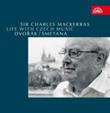 I’ve
recommended some of these recordings individually before but the whole
set is a real winner at such a give-away price – the CDs cost around
£33. The only snag is that you may have to re-number all 51 tracks
in Windows Explorer in order to get the first Slavonic Dance and the
first movement of Symphony No.8 to play in the right order. If they
appear to be out of order, back up the files first and add numbers from
01 to 51 to the beginnings of the file names, numbering the first Slavonic
Dance as track 01 and the first movement of Symphony No.8 as track 43.
Then sit back and enjoy seven hours of glorious music wonderfully performed.
I’ve
recommended some of these recordings individually before but the whole
set is a real winner at such a give-away price – the CDs cost around
£33. The only snag is that you may have to re-number all 51 tracks
in Windows Explorer in order to get the first Slavonic Dance and the
first movement of Symphony No.8 to play in the right order. If they
appear to be out of order, back up the files first and add numbers from
01 to 51 to the beginnings of the file names, numbering the first Slavonic
Dance as track 01 and the first movement of Symphony No.8 as track 43.
Then sit back and enjoy seven hours of glorious music wonderfully performed.
Recording of the Month
 Jean
SIBELIUS (1865-1957)
Jean
SIBELIUS (1865-1957)
Pohjola’s Daughter, Op.49 [13:13]
The Oceanides, Op.73* [10:23]
Symphony No. 2 in D, Op.43** [46:44]
Hallé/Sir Mark Elder
rec. 4 February 2007, Bridgewater Hall, Manchester; *2 August 2006,
BBC Studio 7, Manchester; ** live, 19-20 September 2012, Bridgewater
Hall, Manchester.
HALLÉ CDHLL7526 [70:59] – from emusic.com
(mp3)
[‘[T]here are three admirable Sibelius performances here…
This is another excellent addition to the Elder/Hallé discography.
I hope that the remaining Sibelius symphonies will follow.’ See
review
by John Quinn.]
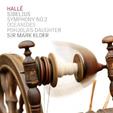 To
judge from John Quinn’s review, he must have been tempted to make
this his Recording of the Month, an accolade which I see
has been bestowed by BBC Music Magazine and one which I see no reason
to withhold. The performances are powerful and the (mostly live) recording
does them full justice. Only the lack of a booklet presents a problem.
To
judge from John Quinn’s review, he must have been tempted to make
this his Recording of the Month, an accolade which I see
has been bestowed by BBC Music Magazine and one which I see no reason
to withhold. The performances are powerful and the (mostly live) recording
does them full justice. Only the lack of a booklet presents a problem.
Full marks to emusic.com for getting this online before their competitors
– it still had not appeared from classicsonline.com or Naxos Music
Library at the time of writing. At £2.52 it’s also the least
expensive download that you are likely to find and the bit-rate, around
220kb/s, while not ideal, is little less than you would get from amazon.co.uk
or iTunes and it more than adequately conveys the wide-ranging recording.
Even if you already have a recording of the Second Symphony, it’s
well worth having the Hallé version too. Other recordings of
the tone poems very well worth considering:
• BIS-CD-1225: En Saga; The Dryad; Pohjola’s
Daughter; Night Ride and Sunset; The Bard; The Oceanides. Lahti Symphony
Orchestra/Osmo Vänskä [71:15] – from eclassical.com
(mp3 and lossless, no booklet, inlay card only) or stream from Naxos
Music Library. [Recording of the Month – see review
by Tony Haywood. NB: one short track, track 3 of the original CD, is
omitted from the eclassical.com download, but can be obtained from emusic.com
for £0.42.] Also included in BIS-CD-1900/02, 5 CDs for
the price of 3 on disc and as a download from classicsonline.com,
but no reduction in price from eclassical.com. See review
by Rob Barnett.
• CHANDOS CHAN6508: Finlandia; Pohjola’s Daughter;
The Swan of Tuonela; The Oceanides; Tapiola: Scottish National
Orchestra/Alexander Gibson [54:23] (from theclassicalshop.net,
mp3 and lossless, with pdf booklet) – a recommendable collection
at budget price (£4.99 for lossless). Also available:
• CHANDOS CHAN241-19: as above, plus Luonnotar, Spring
Song; The Bard; The Dryad and Night Ride and Sunrise [109:32] 2 CDs
for the price of one from theclassicalshop.net
(mp3 and lossless, with pdf booklet) or stream from Naxos Music Library.
Jean SIBELIUS
The Unknown Sibelius: Rarities and first recordings
Finland Awakes (original version of Finlandia, 1899?) [8:36]
The Oceanides, Op. 73 (1914 – Yale version) [7:37]
Jag kysser dig [och ledsnar] ej (1889-91) [0:59]
Tule, tule kultani [Come, Come, My Sweetheart] [1:20]
Tanken [The Thought], JS 192 (1915) [1:36]
Italian Folk Song Arrangements, JS99 [4:56]
Fridolins dårskap [Fridolin’s Folly], JS84 [2:34]
Jone havsfärd [Jonah’s Voyage], JS100 [2:38]
Serenata, JS169 (1887) [7:01]
Ödlan (The Lizard), Op.8 (1909) [17:17]
Andantino in D for piano (1889) [3:04]
Impromptu in b minor for piano (c.1893) [7:23]
Adagio in E for piano, JS13 (1907) [1:58]
Adagio for piano four hands, JS 161(1931) [4:39]
Four Orchestral Fragments (for Symphony No.8?), HUL1325, 1326/9, 1326/10,
1327 (1930-57) [3:17]
Processional, Op.113/6 (1927, orch. 1938) [4:12]
Performers include:
Helena Juntunen (soprano)
Anne Sophie von Otter, Monica Groop (mezzo-soprano)
Bengt Forsberg, Peter Lonnqvist (piano)
Dominante Choir, Orphei Drängar
Lahti Symphony Orchestra/Osmo Vänskä, Okko Kamu, Robert Sund
Pdf booklet with texts included
BIS-CD-2065 [79:07] from eclassical.com
(mp3, 16– and 24-bit lossless)
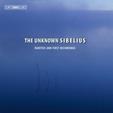 Some
of these rarities have already appeared in the BIS Complete Sibelius
Edition but others have been discovered since the completion of
that magnum opus. Among the new recordings, the late orchestral fragments
earned a certain celebrity in October 2011, as media across the world
greeted the discovery of what was soon proclaimed to be sketches for
the famed 8th Symphony. Dr. Timo Virtanen, the respected authority on
Sibelius, has prepared the sketches for the present recording and also
written a text – available on the BIS web site – discussing
them and the context in which they may have been written. Don’t
get too excited, however; all that we have amounts to little more than
three minutes, directed by that underrated Sibelius conductor Okko Kamu,
so there’s no prospect of a completion in the manner of Mahler’s
Tenth or Elgar’s Third.
Some
of these rarities have already appeared in the BIS Complete Sibelius
Edition but others have been discovered since the completion of
that magnum opus. Among the new recordings, the late orchestral fragments
earned a certain celebrity in October 2011, as media across the world
greeted the discovery of what was soon proclaimed to be sketches for
the famed 8th Symphony. Dr. Timo Virtanen, the respected authority on
Sibelius, has prepared the sketches for the present recording and also
written a text – available on the BIS web site – discussing
them and the context in which they may have been written. Don’t
get too excited, however; all that we have amounts to little more than
three minutes, directed by that underrated Sibelius conductor Okko Kamu,
so there’s no prospect of a completion in the manner of Mahler’s
Tenth or Elgar’s Third.
It’s chippings from the block, then, but a master mason’s
block and indicative of what might have been a very interesting work.
With the alternative versions of Finlandia – more passionate
than the familiar version – and Oceanides and Ödlan,
a work I’d never heard before, for solo violin and string ensemble,
we’re dealing with something more substantial and very worthwhile.
Otherwise the programme is somewhat bitty but well worth hearing. Try
this when it becomes available for streaming from Naxos Music Library
if you’re unsure.
All the music is in good hands. The recordings were made in 44.1 and
96kHz format, so even the best version is only 24/44.1, but it all sounds
well up to the usual BIS standard. Some of the BIS Sibelius recordings
have had striking covers; this rather nondescript affair is not one
of them.
Sergei RACHMANINOV (1873-1943)
Rhapsody on a Theme of Paganini, Op.43 (1934) [23:07]
Symphony No.3 in a minor, Op.44 (1936) [44:36]
Yevgeny Sudbin (piano)
Singapore Symphony Orchestra/Lan Shui
rec. July/August 2011, Esplanade Concert Hall, Singapore. DDD/DSD
pdf booklet included
BIS-SACD-1988 [68:32] – from eclassical.com
(mp3, 16/44.1 & 24/96 lossless)
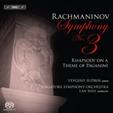 I
recently welcomed the Sudbin/Shui coupling of Rachmaninov’s Symphony
No. 1 and First Piano Concerto (review)
and was sufficiently impressed to download their versions of the Third
Symphony and Paganini Rhapsody. Still fresh from a bout of comparative
listening that included newcomer Valentina Lisitsa and the LSO and veteran
Vladimir Ashkenazy and the Concertgebouw in the concertos – the
latter in the symphonies too – I was struck anew by the sheer lucidity
and directness of these Singapore performances. That said, I’ve
no qualms about Sudbin in this repertoire but at this point I’m
still ambivalent about Shui’s take on the first two symphonies;
perhaps his Third would clarify matters somewhat.
I
recently welcomed the Sudbin/Shui coupling of Rachmaninov’s Symphony
No. 1 and First Piano Concerto (review)
and was sufficiently impressed to download their versions of the Third
Symphony and Paganini Rhapsody. Still fresh from a bout of comparative
listening that included newcomer Valentina Lisitsa and the LSO and veteran
Vladimir Ashkenazy and the Concertgebouw in the concertos – the
latter in the symphonies too – I was struck anew by the sheer lucidity
and directness of these Singapore performances. That said, I’ve
no qualms about Sudbin in this repertoire but at this point I’m
still ambivalent about Shui’s take on the first two symphonies;
perhaps his Third would clarify matters somewhat.
For many years André Previn’s classic LSO version of this
symphony has held sway at chez Mahlerei, even though it has the characteristic
fierceness that blights so many of EMI’s LP-to-CD transfers. As
for the BIS recording, once the volume has been upped the sound is full,
warm and detailed. As a reading this new Rachmaninov 3 is lithe and
alert, the very antithesis of Ashkenazy’s bold but somewhat overpowering
one. Shui and his well-blended band really do tap into the Lento’s
essential yearning, and the whole enterprise is judiciously balanced
between introspective murmurings and extrovert bellows.
Indeed, those used to vodka-drenched versions may find Shui a little
tame at times, although what his reading may lack in heat it more than
makes up for in glowing detail and delicacy. That’s certainly true
of the Adagio, which has rarely sounded so poised. The velvety
strings and gentle harp flourishes are simply magical, and the BIS team
have done well to capture this band at its best. After all that incident
– more than I hear in many rivals – Shui’s propulsive
finale is fiery without being overcooked. All of which makes this the
best of Shui’s Rachmaninov so far.
The symphony takes second place – on the download, if not in terms
of musicality – to Sudbin’s splendid rendition of the Rhapsody;
as before there’s a nervous energy to his playing that suits those
cat-on-a-hot-tin-roof moments in the score; he also brings a lovely,
expressive lilt to the more lyrical variations. Unlike some recordings
– Ashkenazy/Haitink, Wild/Horenstein – the balance is very
believable, with neither the soloist nor the orchestra allowed to dominate.
So, two persuasive performances whose freshness and spontaneity rescue
these old war horses from the knacker’s yard.
Well worth a flutter.
Dan Morgan
http://twitter.com/mahlerei
[There’s little to add to Dan’s review. The ‘big tune’
in the Paganini Rhapsody – the one that seems to me to shout
‘Rachma-an-in-ov’ – might have been a little more yearning.
I still rate Vladimir Ashkenazy and André Previn (Double Decca),
Stephen Hough and Andrew Litton (Hyperion) and Earl Wild and Jascha
Horenstein (Chandos*) top of the very competitive concertante Rachmaninov
tree, but this comes close and that’s my only pretty minor reservation.
Like Dan I still rate André Previn highly in the symphony but
the 24/96 sound on the new BIS is superior and the performance is enjoyable
– with all the wallowy yearning that I found a little lacking in
the Rhapsody. BW]
* Illogically, the mp3 set costs half as much again and the lossless
twice as much as the CDs.
Bargain of the Month
Sergei RACHMANINOV Piano Trios
 Trio
élégiaque No.1 in g minor [12:44]
Trio
élégiaque No.1 in g minor [12:44]
Two pieces for cello and piano, Op.2 [10:21]
Two pieces for violin and piano, Op.6 [10:11]
Trio élégiaque No.2 in d minor [41:54]
The Moscow Rachmaninov Trio – rec.2000. DDD
Pdf booklet included
HYPERION HELIOS CDH55431 [75:10] – from hyperion-records.co.uk
(mp3 and lossless)
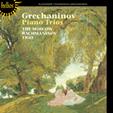 At
full price this recording merited a four-star recommendation in the
Penguin Guide (out of three!) and our own Colin Clarke thought it preferable
to the Chandos recording from the Bekova Sisters, not least because
their recording offers only the two Trios (4-star review).
At
full price this recording merited a four-star recommendation in the
Penguin Guide (out of three!) and our own Colin Clarke thought it preferable
to the Chandos recording from the Bekova Sisters, not least because
their recording offers only the two Trios (4-star review).
That recording from the Bekovas is now available only as a download
but Chandos have a more recent offering from the Borodin Trio which
I recommended in my June
2009 DL Roundup. As performances that and the new Hyperion are both
top contenders but the inclusion of the shorter pieces and the price
decrease (£5.99 in mp3 and lossless) makes the Hyperion reissue
the better proposition – unless you want lossless for your main
system and mp3 for your personal player, which Chandos allow you to
obtain for no extra cost and Hyperion don’t. (See my remarks in
the Dowland review above.) Both mp3 and lossless versions of the Hyperion
sound fine, the latter especially so. The piano is dominant in the soundscape;
if the recording has to be slightly less than perfectly balanced, that’s
probably the right priority.
Also recommended at budget price on the same label from the same performers:
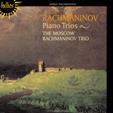 Alexandr
GRECHANINOV (1864-1956)
Alexandr
GRECHANINOV (1864-1956)
Piano Trio No.1 in c minor, Op.38 (1906) [26:55]
Cello Sonata in e minor, Op.113 (1927) [18:54]
Piano Trio No.2 in G, Op.128 (1930) [18:04]
The Moscow Rachmaninov Trio – rec. 2000. DDD
Pdf booklet included
HYPERION HELIOS CDH55399 [63:53] – from hyperion-records.co.uk
(mp3 and lossless)
Staying with Grechaninov, his Vespers (more correctly All
Night Vigil) and other music also comes from Hyperion on a budget
reissue:
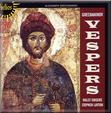
Holst Singers/Stephen Layton, with James Bowman (counter-tenor) –
rec. November 1998, DDD.
Pdf booklet included, with transliterated Old Slavonic texts and translations.
HYPERION HELIOS CDH55353 [63:16] – from hyperion-records.co.uk
(mp3 and lossless) [See review by Ralph Moore for details.]
Two inexpensive reissues which may be confidently recommended to all
those interested in this repertoire. In both cases mp3 and lossless
sound very well, with the usual slight preference for the latter.
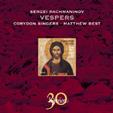 The
Corydon Singers’ 1990 recording of the Rachmaninov Vespers
with Matthew Best at the helm [65:17] has done sterling service in my
CD collection since it was first released. Like many early Hyperion
CDs, it’s become slightly ‘bronzed’ but it’s still
eminently playable. It’s available as a download – two catalogue
numbers at the same price, £7.99 for mp3 or lossless: CDA66460
or CDA30016, the latter among the Hyperion at 30 special releases
which are less expensive on CD (£9.99 as against £13.99).
From hyperion-records.co.uk,
with pdf booklet.
The
Corydon Singers’ 1990 recording of the Rachmaninov Vespers
with Matthew Best at the helm [65:17] has done sterling service in my
CD collection since it was first released. Like many early Hyperion
CDs, it’s become slightly ‘bronzed’ but it’s still
eminently playable. It’s available as a download – two catalogue
numbers at the same price, £7.99 for mp3 or lossless: CDA66460
or CDA30016, the latter among the Hyperion at 30 special releases
which are less expensive on CD (£9.99 as against £13.99).
From hyperion-records.co.uk,
with pdf booklet.
 Finally,
reverting to budget price recordings on Hyperion Helios, Rachmaninov’s
setting of the Divine Liturgy of St John Chrysostom (CDH55318,
Corydon Singers/Matthew Best, with pdf booklet [77:17] – from hyperion-records.co.uk).
Though reissued less expensively than the Vespers, the performance
and recording are equally recommendable, the latter very good in mp3
and even better in lossless sound. Recorded in 1994, Ian Lace found
its reissue in 2008 intensely moving – review.
The King’s College version to which he refers is available from
classicsonline.com
for £6.99, or for streaming from Naxos Music Library, but there’s
no booklet with that download.
Finally,
reverting to budget price recordings on Hyperion Helios, Rachmaninov’s
setting of the Divine Liturgy of St John Chrysostom (CDH55318,
Corydon Singers/Matthew Best, with pdf booklet [77:17] – from hyperion-records.co.uk).
Though reissued less expensively than the Vespers, the performance
and recording are equally recommendable, the latter very good in mp3
and even better in lossless sound. Recorded in 1994, Ian Lace found
its reissue in 2008 intensely moving – review.
The King’s College version to which he refers is available from
classicsonline.com
for £6.99, or for streaming from Naxos Music Library, but there’s
no booklet with that download.
The Romantic Piano Concerto Vol. 60
Théodore DUBOIS (1837-1924)
Concerto-Capriccioso in c minor (1876) [16:18]
Piano Concerto in f minor (1897) [27:59]
Suite for piano and string orchestra in f minor (1917) [21:05]
Cédric Tiberghien (piano)
BBC Scottish Symphony Orchestra/Andrew Manze
rec. 13-14 June 2012, City Halls, Candleriggs, Glasgow, UK
HYPERION CDA67931 [65:24] – from hyperion-records.co.uk
(mp3, 16-bit & Studio Master 24-bit flacs). Free download track
available.
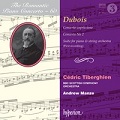 ‘Théodore
Dubois is an unloved figure,’ Alexandre Dratwicki avers in his
articulate and admirably concise liner-notes for this release. A quick
Google appears to confirm that, although Dubois’s organ music –
some of which has a freshness and charm that I find irresistible –
is reasonably well represented. Not surprising, perhaps, as he was organist
at La Madeleine, Paris, for almost twenty years. Overshadowed by the
prodigious musical talents of his compatriots he remained a career pedagogue
rather than a self-seeking performer/composer, which might explain why
much of his oeuvre has lain dormant ever since.
‘Théodore
Dubois is an unloved figure,’ Alexandre Dratwicki avers in his
articulate and admirably concise liner-notes for this release. A quick
Google appears to confirm that, although Dubois’s organ music –
some of which has a freshness and charm that I find irresistible –
is reasonably well represented. Not surprising, perhaps, as he was organist
at La Madeleine, Paris, for almost twenty years. Overshadowed by the
prodigious musical talents of his compatriots he remained a career pedagogue
rather than a self-seeking performer/composer, which might explain why
much of his oeuvre has lain dormant ever since.
Enter Hyperion, whose long-running Romantic Piano Concerto series has
reached yet another milestone. Given that the raison d’être
of this project is to unearth all these concertos, including the justifiably
neglected and obscure, there are bound to be some duds along the way.
That said I’ve heard a fair few, and with the help of first-rate
pianists, ensembles and sonics even the less interesting works have
been very persuasively presented. Volume 59 is a case in point; Zarzycki
and Żeleński are good if not great composers, yet the works
recorded here still have the capacity to surprise and delight (review).
There’s no shortage of melodic interest in Dubois’s Concerto-Capriccioso,
whose concise proportions conceal a work of some virtuosity. Romantically
inclined yet surprisingly formal at times it’s an engaging piece
that never oversteps its limits. The orchestral writing certainly isn’t
distinguished, so it’s left to French pianist Cédric Tiberghien
to engage and sustain the listener’s interest. That he does, with
an easeful delivery that emphasises clarity and colour; articulation
is good, dynamics are nicely shaded and the score’s more reflective
moments stay clear of self-indulgent doodles – just.
Emphatically not great music – conductor Andrew Manze and
the BBCSSO do their best with Dubois’s rhetorical flourishes –
but the second concerto is much surer of foot and focus. Dubois is more
spontaneous in the opening Allegro, which Tiberghien despatches
with considerable elegance and point. I still don’t care for Dubois’s
workmanlike accompaniment, but the piano writing is rather more accomplished.
Despite its sober mien the Adagio has a Brahmsian largesse that
appeals, and there’s even a hint of mischief in the brief dissonances
of the rambling Allegro vivo.
Hyperion are well-known for their enviable recordings of solo piano
pieces, and while there’s much to admire here in terms of the soloist’s
fine clarity and pleasing timbres the orchestra sounds unusually diffuse
at times. Indeed, I found this Studio Master underwhelming compared
with some of Hyperion’s recent, class-leading downloads. That’s
less of an issue in the endearing Suite – written when the composer
was 80 – where Tiberghien captures the youthful passion, quick
wit and will-o’-the-wisp qualities of this alert, effervescent
piece. All this unaccustomed bubble and brio keeps Manze and his players
on their toes too.
Avid collectors of this series will buy this new volume regardless,
while others – perhaps familiar with Tiberghien’s fine pianism
– will want it for that alone. Indeed, when the material is as
variable as this – let’s be honest, it’s pretty threadbare
at times – a decent soloist can make the difference between drudgery
and delight. As for Manze and his band they’re dutiful rather than
inspired, but then there isn’t always a great deal to work with.
Not the best in this series by a long chalk; mildly diverting though.
Dan Morgan
http://twitter.com/mahlerei
[Since Dan has reviewed the Studio Master version, I tried the mp3 and
found more delight than drudgery, though it’s true that the orchestral
accompaniment sometimes sounds like Saint-Saëns at less than his
best. The mp3 sounds lifelike enough even on an audio system if you
want that format for your personal player – I think the rather
diffuse orchestral sound is more down to Dubois than the Hyperion engineers.
Enjoyable enough but, as Dan says, not first choice from this often
very valuable series. BW.]
Igor STRAVINSKY (1882-1971)
L’Oiseau de Feu (Firebird) – Suite (1919) [21:49]
Le Sacre du Printemps (Rite of Spring) (1913) [33:10]
Orchestre National du Capitole de Toulouse/Tugan Sokhiev – rec.
September 2011
Pdf booklet included
NAÏVE V5192 [54:59] – from eclassical.com
(mp3 and lossless)
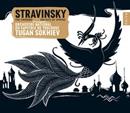 For
John Quinn, this recording gets the centenary celebrations of The
Rite of Spring off to a good start – review.
For
John Quinn, this recording gets the centenary celebrations of The
Rite of Spring off to a good start – review.
On disc the audio recordings are accompanied by a DVD of The Rite
of Spring, which makes up for the short playing time of the CD.
The download comes without that, but the short playing time is taken
care of by eclassical.com’s policy of charging per second, $9.91
for both the mp3 and lossless. Even so, it would have been nice to have
had the complete Firebird, not just the Suite – the two
ballets can fit on one CD, as on the mid-price Sony reissue of Stravinsky’s
own performances, which remains my prime recommendation (SMK89875).
There doesn’t seem to be a download of that, but there is of the
very inexpensive EMI 2-CD Simon Rattle set of Firebird, Rite,
Petrushka and Apollo, which will also do very nicely –
review:
download for £4.99 from sainsburysentertainment.co.uk.
If you insist on Rattle’s latest Rite (2012, live), that
can be yours from the same source for £6.99 – here.
My regret that only the Firebird Suite is included here is all
the greater because I enjoyed Sokhiev’s colourful performance of
that work much more than his Rite. Both works are very well recorded
but the beauty of sound which makes this Firebird so attractive
is less appropriate to the Rite which, after all, takes up the
greater half of this recording. Though this version of the Rite
is not without its moments of power and drama, my preferences must remain
with the versions which I’ve mentioned. If you choose the newer
Rattle recording and are, therefore, still in need of a version of Firebird,
the classic LSO/Dorati version is still available as a download only
in mp3 or lossless from deutschegrammophon.com.
His slightly less recommendable later Detroit versions of Firebird,
Rite, Apollo and Petrushka are now available on
a recent 2-CD Decca reissue, from 7digital.com
for £8.49.
Alternatively, there’s the very fine OPMC Classics recording of
Firebird, Petrushka, Rite and Pulcinella
from Yakov Kreizberg which I made Recording of the Month
– review.
It runs extravagantly to three CDs and it’s not available to download,
but it comes at budget price, around £19. For other recommendable
recordings of Firebird, see my review of BIS-SACD-1874 in Download
News 2012/22. For a comparison of the recordings of Rite of Spring
by Andrew Litton (BIS-SACD-1474: Dominy Clements’ Recording
of the Month) and Iván Fischer (Channel Classics CCSSA32112)
with each other and other recordings, see my March
2012/2 DL Roundup.
If you really want to celebrate the centenary of Rite of Spring in
style, there’s a 20-CD set of all the recordings of that work released
by DG and Decca from 1946 to 2010: 478 3729 – download in mp3 or
lossless from deutschegrammophon.com.
Igor STRAVINSKY Complete works for piano and orchestra
Song of the Volga Boatmen [1:19]
Concerto for Piano and Wind Instruments [18:36]
Capriccio for Piano and Orchestra [17:06]
Movements for Piano and Orchestra [9:18]
Concerto in D (Basle Concerto) [12:53]
Canon on a Russian Popular Tune [1:04]
Steven Osborne (piano)
BBC Scottish Symphony Orchestra/Ilan Volkov – rec. May 2012. DDD.
Pdf booklet included
HYPERION CDA67870 [60:16] – from hyperion-records.co.uk
(mp3, 16– and 24-bit lossless)
CDA67870.jpg) This
coupling is so obvious that I’m surprised that no-one has recorded
the works together before. Only the ‘Basle’ Concerto in D
doesn’t feature piano and orchestra.
This
coupling is so obvious that I’m surprised that no-one has recorded
the works together before. Only the ‘Basle’ Concerto in D
doesn’t feature piano and orchestra.
My benchmark for the Concerto for Piano and Wind must, I’m sorry
to say, remain embedded in my mind, since the Stravinsky portion of
the LP on which it figured has never been reissued on CD: Stephen Bishop,
as he was then, with Colin Davis and the BBCSO on Philips SAL3779, with
Bartók’s Second Piano Concerto. The Bartók has been
reissued on a recommendable CD of all three concertos (Philips Eloquence
4611882 – download only from prestoclassical.co.uk)
but not the Stravinsky and it’s much too recent a recording to
hope that someone like Beulah will restore it for us. The new recording
didn’t make the same impact on me as that Philips LP but nostalgia
plays tricks with the memory and I was hearing the music for the first
time when I bought that LP in around 1970.
Whatever very slight reservations I may have about the impact of the
Concerto for Piano and Wind, there’s no current rival of which
I know that I would prefer and the same goes for the Capriccio
– again nostalgia harks back to Nikita Magaloff and Ernest Ansermet
on a Decca Ace of Diamonds LP of that work with the Concerto for Piano
and Wind which a colleague owned at about the same time and which is
currently available on a multi-CD download from prestoclassical.co.uk.
(467 8182, not available in the UK. Emusic.com have a Hallmark
transfer of the two Stravinsky works for £2.52 but I can’t
vouch for the quality.)
No problems with memories, true or false, with the quirky Movements
and the Concerto in D; even if I still had access to those LPs or Michel
Béroff’s highly regarded recording on a budget EMI twofer
of Capriccio (9072512 – review),
the new recording would still be extremely valuable. Many will, in any
case, prefer the new recording of Capriccio to what some have
found to be Béroff’s slightly relentless performance –
I didn’t find it too hard-driven – and even if you bought
or intend to buy that set of concertante works your return for
a small financial layout will or would have been well worth it: download
from sainsburysentertainment.co.uk.
The Concerto in D, composed for Paul Sacher and sometimes known as the
Basle Concerto, though it’s the odd one out in terms of
there being no piano concertante role, also receives a very good
performance. It may not be as immediately attractive as its relative,
Dumbarton Oaks, but Ilan Volkov and the BBC Scottish make as
strong a case for it as any that I’ve heard, including Karajan
(DG Originals 4474352, with Honegger Symphonies 2 and 3 –
download from 7digital.com).
Arnold BAX (1883-1953)
Two additional pieces of information regarding existing recommendations:
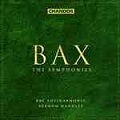 The
complete Bax Symphony cycle on CHAN10122 - review
- is now available in 24/96 lossless sound, albeit at a rather expensive
£49.90, in addition to mp3 (£23.97) and 16-bit lossless
(£29.97) from theclassicalshop.net.
There are highly recommendable individual recordings of the symphonies
on Naxos but the Chandos complete set of the Vernon Handley performances,
coupled with Rogue's Comedy Overture and Tintagel plus
an interview with the conductor, is very special.
The
complete Bax Symphony cycle on CHAN10122 - review
- is now available in 24/96 lossless sound, albeit at a rather expensive
£49.90, in addition to mp3 (£23.97) and 16-bit lossless
(£29.97) from theclassicalshop.net.
There are highly recommendable individual recordings of the symphonies
on Naxos but the Chandos complete set of the Vernon Handley performances,
coupled with Rogue's Comedy Overture and Tintagel plus
an interview with the conductor, is very special.
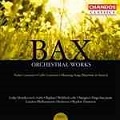 I've
recommended the separate full-price release of the Cello Concerto (CHAN8494
- review)
but failed to notice its better-value reissue at mid-price with the
Violin Concerto and Morning Song - one concertante work each for cello,
violin and piano on CHAN10154X. - from theclassicalshop.net.
The blame must lie partly with Chandos - typing Bax Violin Concerto
or Bax Cello Concerto in their search engine won't bring up this
recording, which is indexed simply as Orchestral Works Volume 1.
I've
recommended the separate full-price release of the Cello Concerto (CHAN8494
- review)
but failed to notice its better-value reissue at mid-price with the
Violin Concerto and Morning Song - one concertante work each for cello,
violin and piano on CHAN10154X. - from theclassicalshop.net.
The blame must lie partly with Chandos - typing Bax Violin Concerto
or Bax Cello Concerto in their search engine won't bring up this
recording, which is indexed simply as Orchestral Works Volume 1.
Alfredo CASELLA (1883-1947)
Italia, Op. 11 (1909) [19:39]
Introduzione, Corale e Marcia, Op. 57 (1931-1935) [7:41]
Sinfonia, Op. 63 (Symphony No. 3) (1939-1940) [41:55]
BBC Philharmonic/Gianandrea Noseda
rec. 28 June 2012 (Italia), 6-7 November 2012 (Introduzione, Sinfonia),
MediaCity, Salford, UK
Pdf booklet included
CHANDOS CHAN10768 [68:55] – from theclassicalshop.net
(mp3, 16-bit lossless and Studio 24/96)
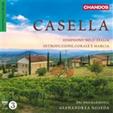 The
Casella risorgimento continues with this third volume in Chandos’s
superb BBC Philharmonic/Noseda series. I was particularly impressed
with the first outing, which boasts a blazing performance of the Mahlerian
Second Symphony (review)
but the next instalment – headlined by the Concerto for Orchestra
– isn’t too far behind (review).
I can also recommend the rival Naxos CDs featuring Francesco La Vecchia
and the Rome Philharmonic, several of which I’ve reviewed on the
main site.
The
Casella risorgimento continues with this third volume in Chandos’s
superb BBC Philharmonic/Noseda series. I was particularly impressed
with the first outing, which boasts a blazing performance of the Mahlerian
Second Symphony (review)
but the next instalment – headlined by the Concerto for Orchestra
– isn’t too far behind (review).
I can also recommend the rival Naxos CDs featuring Francesco La Vecchia
and the Rome Philharmonic, several of which I’ve reviewed on the
main site.
Noseda kicks off with Italia, an early ‘symphonic rhapsody’
in which Casella weaves together a variety of folkloric threads to create
a patchy portrait of his homeland. In his meticulous liner-notes Gerald
Larner details the sources of Casella’s inspiration, but even without
these pointers Italia has a fairly obvious narrative. From its rather
lugubrious start the work modulates into something much sunnier, before
retreating and regrouping to end on a more jubilant – albeit sub-Respighian
– note. It’s all very entertaining, but not even a spirited
performance such as this can transform Italia into a first-rate
piece.
No matter, for ‘complete’ traversals will always have their
share of less accomplished works. The secco little Introduzione,
Corale e Marcia isn’t one of them; economically scored for
woodwind, brass, timpani, percussion, piano and double basses it slips
past in under eight minutes. Textures are spare, colours are muted and
there’s a new-found compositional rigour here that marks a stylistic
departure for Casella. That said, the piece isn’t all dry; indeed,
it catches one unawares with its delightfully jaunty finale. The recording
is fine, if a tad airless, and that may have something to do with the
hall at MediaCity. The Second Symphony and Scarlattiana –
recorded in the grateful and expansive acoustic of Studio 7, New Broadcasting
House – sound far more involving than this.
In spite of this the war-time Sinfonia (Symphony No. 3) sounds
pretty impressive. Its emphatic rhythms and stark details are well caught
by the Chandos team and Noseda keeps his players on a tight rein throughout.
Those attuned to the softer Romantic outlines of the First and Second
symphonies must recalibrate their expectations, for the Third is more
sharply drawn. Even so, there are flashes of that old lyricism –
moments of repose if you will – notably at the start of the moody
Andante.
There is much to admire in the Sinfonia, not least Casella’s
lean but alluring textures and his finely shaded dynamics. There’s
little doubt the composer is very much in control of his material, and
it’s hard to imagine much of it ending up on the metaphorical cutting-room
floor. The orchestra plays with commendable feeling, and there’s
a gentle but persistent momentum here that one doesn’t always sense
in La Vecchia’s otherwise admirable account. Most pleasing, perhaps,
is the scale and sensitivity of the writing, which abjures the impetuousness
and gaudy splendour of Casella’s youthful oeuvre. Even the
extrovert Rondo Finale is well proportioned, and it too is played
with refreshing clarity and point.
This is a welcome release, even if it doesn’t have the instant,
embraceable appeal of the earlier instalments. You won’t find many
versions of Italia and the Introduzione, Corale e Marcia
is recorded here for the first time, but when it comes to the Sinfonia
I would probably choose La Vecchia’s warmly expressive and surprisingly
colourful account over Noseda’s cooler, more cerebral one. Now
I look forward to the Concerto Romano – scored for organ,
brass, timpani and strings – which I encountered recently in two
block-busting performances by Martin Schmeding and Martin Haselböck.
Now that really is gaudy, but it’s great fun too.
Dan Morgan
http://twitter.com/mahlerei
Freebie of the Month
 Sir
Eugene GOOSSENS (1893-1962)
Sir
Eugene GOOSSENS (1893-1962)
Four Sketches for Flute (or Violin), Violin and Piano, Op.5 (1913) [15:04]
Three Pictures for Flute and Piano, Op.55 (1935) [18:28]
Five Impressions of a Holiday (Cinq Impressions d’un séjour
à la campagne) for Flute or Violin, Cello and Piano, Op.7
(1914) [15:56]
Suite for Flute (or Violin), Violin and Harp (or Piano) To Miss (Miriam)
Timothy, Op.6 (1914) [10:32]
Pastorale et Arlequinade for Flute (or Violin), Oboe (or Violin)
and Piano à Léon Goossens, Op.41 (1924) [7:48]
London Chamber Music Group (Susan Milan (flute); David Theodore (oboe);
Jan Peter Schmolck (violin); John Heley (cello); Christina Rhys (harp);
Ian Brown (piano) – rec. 2004. DDD.
Pdf booklet included
CHANDOS CHAN10259 [68:09] – from theclassicalshop.net
(mp3 and lossless)
[see review
by Rob Barnett.]
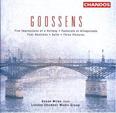 This
is the latest free gift in mp3 format to subscribers to the Chandos
newsletter – it’s worth signing up now for the next time.
If you are familiar at all with the name of Eugene Goossens, it’s
probably as a conductor, but he was a composer too and Chandos deserve
credit for reminding us. The music is unpretentious but charming –
the French titles of two of the works give a clue to the debt to Debussy
and Ravel – and the performances do it full justice, with Susan
Milan in particular giving excellent account of herself. As the free
download is in mp3 only, it’s in that form that I listened to it
and found it perfectly acceptable.
This
is the latest free gift in mp3 format to subscribers to the Chandos
newsletter – it’s worth signing up now for the next time.
If you are familiar at all with the name of Eugene Goossens, it’s
probably as a conductor, but he was a composer too and Chandos deserve
credit for reminding us. The music is unpretentious but charming –
the French titles of two of the works give a clue to the debt to Debussy
and Ravel – and the performances do it full justice, with Susan
Milan in particular giving excellent account of herself. As the free
download is in mp3 only, it’s in that form that I listened to it
and found it perfectly acceptable.
Chandos have also given us two volumes of Goossens’ Orchestral
Music with the Melbourne Symphony Orchestra:
• Volume 1: CHSA5068 [64:14] – conducted by Richard
Hickox: download from theclassicalshop.net
(mp3, and lossless) – for details see review
• Volume 2: CHSA5119 [73:36] – conducted by Andrew
Davis: download from theclassicalshop.net
(mp3, 16– and 24-bit lossless and surround) – for details
see review
Douglas COATES (1898-1974) Violin Concerto in D major (1934)
[25:07]
E.J. MOERAN (1894-1950) Violin Concerto (1937-41) [32:58]
Colin Sauer (violin), BBC Northern Orchestra/Sir Charles Groves (Coates)
Alfredo Campoli (violin), BBC Symphony Orchestra/ Sir Adrian Boult (Moeran)
rec. from live BBC broadcasts 15 March 1951 (Coates); 1954 (Moeran),
mono, historical sound. ADD
DIVINE ART HISTORICAL DDH27806 [59:46] – from theclassicalshop.net
(mp3 and lossless)
[‘A surprising discovery (the Coates) that survived against the
odds and a hothouse performance of the Moeran.’ See review
by Rob Barnett and review
by John Quinn.]
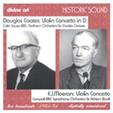 I
must apologise for having missed this recording of the Moeran Violin
Concerto when I reviewed the Albert Sammons version on Symposium last
time round. I can’t claim that the Coates concerto, which comes
first, is a neglected masterpiece, but it certainly deserved better
than the cold shoulder it apparently received from the avant-gardistes
at the BBC who thought it too romantic and made the composer feel so
dejected that he seems to have destroyed the score. I can’t imagine
that its sole performance having been on the Light Programme did much
for the credibility of composer and music.
I
must apologise for having missed this recording of the Moeran Violin
Concerto when I reviewed the Albert Sammons version on Symposium last
time round. I can’t claim that the Coates concerto, which comes
first, is a neglected masterpiece, but it certainly deserved better
than the cold shoulder it apparently received from the avant-gardistes
at the BBC who thought it too romantic and made the composer feel so
dejected that he seems to have destroyed the score. I can’t imagine
that its sole performance having been on the Light Programme did much
for the credibility of composer and music.
The Moeran receives a more heartfelt performance from Alfredo Campoli
than from dedicatee Albert Sammons on Symposium or Lydia Mordkovitch
on Chandos. You may feel the approach more suited to Bruch than to Moeran
but I enjoyed this different take on the music and you may well prefer
it if you think that the work usually sounds too languorous. My own
recommendation would to go for the Mordkovitch first and foremost –
at mid price and coupled with the Cello Concerto on CHAN10168
– but to have one or both of the historical versions as a supplement.
Considering their provenance – acetate discs rescued from a dustbin
and a tape from an AM broadcast, originally complete with the kind of
whistles that I remember all too well afflicted AM after dark, the re-mastering,
undertaken by Pristine Audio is a triumph.
Recommended Reissue
 Herbert
HOWELLS (1892-1983) Music for strings
Herbert
HOWELLS (1892-1983) Music for strings
Concerto for string orchestra (1938) [31:35]
Elegy for solo viola, string quartet, and string orchestra, Op.15 (1917)*
[10:38]
Suite for string orchestra (1942) [20:40]
Serenade from Suite, Op. 16 for string orchestra (1917) [4:23]
Andrew Watkinson, Edward Roberts (violin); Matthew Souter (viola); Shuna
Wilson (cello)*
City of London Sinfonia/Richard Hickox – rec.1992. DDD.
Pdf booklet available
CHANDOS CHAN10780X [67:45] – from theclassicalshop.net
(mp3 and lossless).
[formerly CHAN9161]
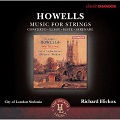 I
hardly did this recording sufficient justice when I recommended it in
its former incarnation in my February
2009 DL Roundup. The music is ethereal, the performances ideal and
the recording very good. At its new price (£4.99 for mp3, £7.99
for lossless) the reissue deserves a strong recommendation, apart from
the anomaly that the lossless download comes at just one penny less
than the CD – considering that some online retailers have discounted
earlier Hickox reissues to £6.50 or even less and will, presumably
do so with the latest batch, that seems highly illogical. Even less
logically, amazon.co.uk are currently charging £7.49 for mp3 downloads
of reissues in this Chandos Hickox reissue series; why would anyone
choose to pay that for less than 320kb/s when theclassicalshop.net charge
just £4.99 for the full-cream version? Classicsonline.com’s
price of £7.99 for mp3 downloads of earlier reissues in the series
is equally illogical, even if they do come at the full 320kb/s.
I
hardly did this recording sufficient justice when I recommended it in
its former incarnation in my February
2009 DL Roundup. The music is ethereal, the performances ideal and
the recording very good. At its new price (£4.99 for mp3, £7.99
for lossless) the reissue deserves a strong recommendation, apart from
the anomaly that the lossless download comes at just one penny less
than the CD – considering that some online retailers have discounted
earlier Hickox reissues to £6.50 or even less and will, presumably
do so with the latest batch, that seems highly illogical. Even less
logically, amazon.co.uk are currently charging £7.49 for mp3 downloads
of reissues in this Chandos Hickox reissue series; why would anyone
choose to pay that for less than 320kb/s when theclassicalshop.net charge
just £4.99 for the full-cream version? Classicsonline.com’s
price of £7.99 for mp3 downloads of earlier reissues in the series
is equally illogical, even if they do come at the full 320kb/s.
Bargain of the Month
 Aaron
COPLAND (1900-1990)
Aaron
COPLAND (1900-1990)
Appalachian Spring – Suite [25:26]
The Tender Land – Suite [20:48]
Boston Symphony Orchestra/Aaron Copland – rec. c.1960. ADD
NAXOS CLASSICAL ARCHIVES 9.81024[46:14] – from classicsonline.com
or emusic.com
(mp3) or stream from Naxos Music Library (not available in the USA,
Australia and several other countries)
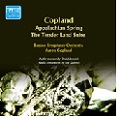 Classic
performances which still sound well -- worth having whatever other versions
of Appalachian Spring you may have and couipled with the less
well-known Tender Land. Even though the emusic.com bit-rate (around
240kb/s) is not ideal, the sound is bright and clear and the performances,
of course, are idiomatic.
Classic
performances which still sound well -- worth having whatever other versions
of Appalachian Spring you may have and couipled with the less
well-known Tender Land. Even though the emusic.com bit-rate (around
240kb/s) is not ideal, the sound is bright and clear and the performances,
of course, are idiomatic.
Eclassical.com offer another Naxos Classical Archives recording of Copland
not only in 320kb/s mp3 but at the same price in lossless flac:
Music for Movies* [16:27]
Music for the Theater** [21:38]
Music for Radio: Prairie Journal* [11:13]
MGM Chamber Orchestra/Arthur Winograd*, Izler Solomon** – rec.
1953-1956. ADD.
NAXOS CLASSICAL ARCHIVES 9.80865 [49:18] – from eclassical.com
(mp3 and lossless) or classicsonline.com
(mp3) or stream from Naxos Music Library (not available in the USA,
Australia and several other countries)
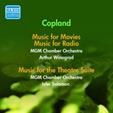 I
don’t think these recordings were ever released in the UK and,
despite their availability in flac and the best efforts of the Naxos
engineers, they sound pretty thin, even for their age, like other MGM
recordings from this period which I’ve heard. Nevertheless, these
are idiomatic performances – much better than I expected from Arthur
Winograd, whose recording of the lighter classics didn’t always
receive much critical acclaim. It may be that the inexpensive 320kb/s
download from classicsonline.com is all that you need – the eclassical.com
is a little dearer – if you live in a country where you are allowed
to download this. Don’t consider downloading it from emusic.com,
unless you wish to use up your monthly allocation, as it will cost you
more than the classicsonline.com for a lower bit-rate, as will the amazon.co.uk
download.
I
don’t think these recordings were ever released in the UK and,
despite their availability in flac and the best efforts of the Naxos
engineers, they sound pretty thin, even for their age, like other MGM
recordings from this period which I’ve heard. Nevertheless, these
are idiomatic performances – much better than I expected from Arthur
Winograd, whose recording of the lighter classics didn’t always
receive much critical acclaim. It may be that the inexpensive 320kb/s
download from classicsonline.com is all that you need – the eclassical.com
is a little dearer – if you live in a country where you are allowed
to download this. Don’t consider downloading it from emusic.com,
unless you wish to use up your monthly allocation, as it will cost you
more than the classicsonline.com for a lower bit-rate, as will the amazon.co.uk
download.
Reissue of the Month
 Benjamin
BRITTEN (1913-1976)
Benjamin
BRITTEN (1913-1976)
The Young Person’s Guide to the Orchestra, Op.34 [17:16]
Suite on English Folk Tunes ‘A time there was...’, Op.90 [15:35]
Suite from ‘Johnson over Jordan’ [17:01]
Four Sea Interludes from ‘Peter Grimes’, Op.33a [16:45]
Bournemouth Symphony Orchestra/Richard Hickox – rec. 1993. DDD.
Pdf booklet available.
CHANDOS CHAN10784X [67:04] – from theclassicalshop.net
(mp3 and lossless)
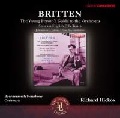 This
is Chandos’ own prime selection from the second batch of reissues
of recordings by Richard Hickox. It makes an excellent memorial to the
composer and conductor alike and it’s an ideal recording both for
those just beginning to explore the music of Britten – the 2013
Birthday Boy – and for established lovers of his music and the
price is right (£4.99 for mp3, £7.99 for lossless). Only
those who prefer the version of YPG with narration need look
elsewhere – strictly, this version should be called Variations
on a Theme of Purcell. The original release on CHAN9221 received
its due of praise but the CD seems to have got lost in a plethora of
recordings of YPG and the Interludes since then, so this offers an excellent
opportunity to sing its praises again. The recording is 16/44.1 only
but sounds very well. All in all, very enjoyable and a strong challenge
to Britten’s own recording of YPG and Interludes
(mid-price Decca 425 6592, with Matinées or on
a 4-CD set recently reissued). Other suppliers may still be offering
CHAN9221 at a higher price, so stay with Chandos’ own theclassicalshop.net;
nor will you save much by downloading Britten’s mid-price Decca
version.
This
is Chandos’ own prime selection from the second batch of reissues
of recordings by Richard Hickox. It makes an excellent memorial to the
composer and conductor alike and it’s an ideal recording both for
those just beginning to explore the music of Britten – the 2013
Birthday Boy – and for established lovers of his music and the
price is right (£4.99 for mp3, £7.99 for lossless). Only
those who prefer the version of YPG with narration need look
elsewhere – strictly, this version should be called Variations
on a Theme of Purcell. The original release on CHAN9221 received
its due of praise but the CD seems to have got lost in a plethora of
recordings of YPG and the Interludes since then, so this offers an excellent
opportunity to sing its praises again. The recording is 16/44.1 only
but sounds very well. All in all, very enjoyable and a strong challenge
to Britten’s own recording of YPG and Interludes
(mid-price Decca 425 6592, with Matinées or on
a 4-CD set recently reissued). Other suppliers may still be offering
CHAN9221 at a higher price, so stay with Chandos’ own theclassicalshop.net;
nor will you save much by downloading Britten’s mid-price Decca
version.
Those in search of a bargain of bargains will find Libor Pešek’s
YPG and Sea Interludes (RLPO), together with the King’s/David
Willcocks Ceremony of Carols and excerpts from other rated EMI
or Virgin recordings on Essential Britten – 2 CDs for just
£2.99 from classicsonline.com.
Benjamin BRITTEN
Spring Symphony, Op.44 [44:44]
Welcome Ode, Op.95 [8:16]
Psalm 150, Op.67 [5:31]
Alfreda Hodgson (contralto), Elizabeth Gale (soprano), Martyn Hill (tenor)
City of London School Choir (Boys), City of London School for Girls
Choir, London Symphony Chorus, Southend Boys Choir,
London Symphony Orchestra/Richard Hickox
CHANDOS CHAN10782X [58:48] – from theclassicalshop.net
(mp3 and lossless).
[formerly CHAN8855]
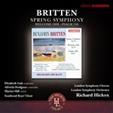 We’re
almost spoiled for choice here. Britten’s own recording of the
Spring Symphony is rather implausibly imprisoned in a 65-CD box
set of his complete works due for reissue on 15 June. I can’t vouch
for the quality of the Emkay transfer from 7digital.com but you may
feel that at £4.99 it’s worth trying if you don’t want
that huge box.
We’re
almost spoiled for choice here. Britten’s own recording of the
Spring Symphony is rather implausibly imprisoned in a 65-CD box
set of his complete works due for reissue on 15 June. I can’t vouch
for the quality of the Emkay transfer from 7digital.com but you may
feel that at £4.99 it’s worth trying if you don’t want
that huge box.
Classicsonline.com have the Previn recording on EMI, coupled with Four
Sea Interludes, for £3.99 – here
– and that I can recommend, though it means possibly duplicating
the Hickox version of the Interludes (above). I described this
as ‘just about the best Spring Symphony on the market’ in
my September
2011/2 DL Roundup. Richard Hickox’s EMI recording comes in
a 5-CD box set from EMI, with other music by Britten, Tippett and Walton,
for around £20 on CD or £19.99 from classicsonline.com.
Sheila Armstrong, Janet Baker and Robert Tear as soloists are the main
attraction here – see review.
Gerald FINZI (1901-1956) Requiem da Camera (1923-25, premiere
recording) [23:42]
Benjamin BRITTEN Deus in adjutorium meum (Psalm 70) (1945)
[5:17]
Chorale after an Old French Carol (1944) [5:00]
Cantata Misericordium, Op.69 (1938) [19:38]
Gustav HOLST (1874-1934) Two Psalms (1912): Psalm 86 [8:23];
Psalm 148 [5:00]
Alison Barlow (soprano), David Hoult (baritone), John Alley (organ),
John Mark Ainsley (tenor), Stephen Varcoe (baritone)
Britten Singers, City of London Sinfonia/Richard Hickox – rec.1991.
DDD.
Pdf booklet with texts included.
CHANDOS CHAN10783X [67:37] – from theclassicalshop.net
(mp3 and lossless).
[formerly CHAN8997]
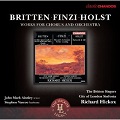 CHAN10783X
brings yet another self-recommending Hickox reissue from Chandos.
CHAN10783X
brings yet another self-recommending Hickox reissue from Chandos.
Benjamin BRITTEN (1913-1976) Violin Concerto Op.15 (1939) [31:15]
Dmitri SHOSTAKOVICH (1906-1975) Violin Concerto no.1in a minor
Op.77 (1948) [35:51]
James Ehnes (violin)
Bournemouth Symphony Orchestra/Kirill Karabits
Pdf booklet included
ONYX4113 [66:56] – from eclassical.com
(mp3 and lossless) or stream from Naxos Music Library
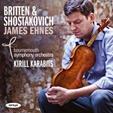 Hard
on the heels of the highly competitive Chandos release of the Britten
Violin Concerto from Tasmin Little and Edward Gardner – CHAN10764,
with the Piano Concerto: review
and DL
News 2013/6: Recording of the Month – comes this
desirable version from James Ehnes and Kirill Karabits. Chandos offer
a sensible coupling with the Piano Concerto; the Onyx comes in an equally
logical coupling with the Shostakovich Violin Concerto No.1 – two
works composed in troubled times and especially attractive for those
who already have the very fine Hyperion version of the Piano Concerto
(CDA67625, with complete works for piano and orchestra: Recording
of the Month – review
and Hyperion
Top 30 Roundup).
Hard
on the heels of the highly competitive Chandos release of the Britten
Violin Concerto from Tasmin Little and Edward Gardner – CHAN10764,
with the Piano Concerto: review
and DL
News 2013/6: Recording of the Month – comes this
desirable version from James Ehnes and Kirill Karabits. Chandos offer
a sensible coupling with the Piano Concerto; the Onyx comes in an equally
logical coupling with the Shostakovich Violin Concerto No.1 – two
works composed in troubled times and especially attractive for those
who already have the very fine Hyperion version of the Piano Concerto
(CDA67625, with complete works for piano and orchestra: Recording
of the Month – review
and Hyperion
Top 30 Roundup).
Ehnes and Karabitts might not be my top recommendation in Britten in
competition with Little and Gardner, but they aren’t far behind.
Likewise, I shall turn to David Oistrakh for the Shostakovich –
budget price Regis RRC1385 with Cello Concerto – review
– but that recording, though decent for its age, is no competition
for the powerful new performance on Onyx, which sounds very fine in
mp3 and even better in lossless flac. I tried both and so can you –
eclassical.com allow you to purchase, download one and return for the
other. At $12.03, too, the eclassical.com version, complete with booklet,
is offered at an attractive price, commensurate with what most suppliers
charge for mp3 only. You’ll find this on offer for £3.36
from emusic.com but the bit-rate is likely to be below eclassical.com’s
320kb/s.
Shostakovich completists who have not yet splashed out on the inexpensive
EMI 3-CD set of concertos which I made Bargain of the Month
– January
2012/2 DL Roundup – should go for that set as well as the new
Onyx and the inexpensive Regis.
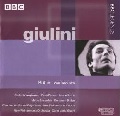 On
the subject of Britten recordings which, while not top choice, challenge
that choice, let me mention that Britten’s own Decca recording
of the War Requiem, though still my first recommendation for
what I consider his undoubted masterpiece – Recording of
the Month August
2009 DL Roundup – has several very serious challengers, not
least from the 1969 live recording on BBC Legends conducted by Carlo
Maria Giulini (BBCL4046-2). With Peter Pears in the tenor role
and Benjamin Britten himself involved in the direction this has a strong
claim to be considered a serious rival to the Decca. With brisk, dramatic
pacing it just fits on one CD [79:00] and the download from eclassical.com
does it full justice, with very good mp3 and even better lossless flac
available at the same price. It also comes complete with a short pdf
booklet but no texts.
On
the subject of Britten recordings which, while not top choice, challenge
that choice, let me mention that Britten’s own Decca recording
of the War Requiem, though still my first recommendation for
what I consider his undoubted masterpiece – Recording of
the Month August
2009 DL Roundup – has several very serious challengers, not
least from the 1969 live recording on BBC Legends conducted by Carlo
Maria Giulini (BBCL4046-2). With Peter Pears in the tenor role
and Benjamin Britten himself involved in the direction this has a strong
claim to be considered a serious rival to the Decca. With brisk, dramatic
pacing it just fits on one CD [79:00] and the download from eclassical.com
does it full justice, with very good mp3 and even better lossless flac
available at the same price. It also comes complete with a short pdf
booklet but no texts.
Another very strong contender on DVD and Blu-ray comes from Andris Nelsons
conducting the 50th-anniversary performance in Coventry Cathedral: Recording
of the Month – review
and review.
Einojuhani RAUTAVAARA (b.1928)
Symphony No. 7 ‘Angel of Light’ [34:19]
Dances with the Winds, Op.69 (Concerto for flutes and orchestra) [21:33]
Cantus Arcticus, Op.61 (Concerto for birds and orchestra) [16:55]
Petri Alanko (flute)
Lahti Symphony Orchestra/Osmo Vänskä
Pdf booklet included
BIS-CD-1038 [72:47] – from eclassical.com
(mp3 and lossless)
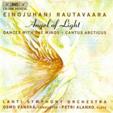 I
recommended this recording in the August
2010 DL Roundup when it was available from passionato.com, but they
are no longer in the download business and I couldn’t resist plugging
it again and directing you to the eclassical.com download – the
home site of BIS recordings.
I
recommended this recording in the August
2010 DL Roundup when it was available from passionato.com, but they
are no longer in the download business and I couldn’t resist plugging
it again and directing you to the eclassical.com download – the
home site of BIS recordings.
It’s almost impossible to describe the music of Rautavaara if you
haven’t heard it – words such as ‘ethereal’ don’t
do it justice, nor are comparisons with Sibelius, though he was undoubtedly
an influence, or other contemporary Eastern European composers such
as Górecki more than a hint in the right direction, but few first-time
listeners are able to resist. Try Cantus Arcticus first if you
can, either in snippets from the eclassical.com website or better as
a whole from Naxos Music Library.
Ondine have developed a strong Rauatavaara catalogue over the years
and you’ll find a number of excellent recordings from that label
for download from classicsonline.com, but this BIS recording is equally
highly to be recommended for the quality of the music, performances
and recording – 16-bit only, but I doubt you’ll think it wanting.
Rob Barnett awarded it ****(*) – review
– and I’m not going to demur except to un-bracket that fifth
star, not just for Cantus but for the other works, too.
Einojuhani RAUTAVAARA Cantus Arcticus [18:41]
Piano Concerto No.1 [20:56]
Symphony No.3 [33:24]
Laura Mikkola (piano); Royal Scottish National Orchestra/Hannu Lintu
– rec. 1997. DDD.
NAXOS 8.554147 [73:32] from classicsonline.com
or stream from Naxos Music Library
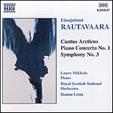
If you are principally looking for Cantus Arcticus and don’t
mind a different, equally evocative, coupling or mp3-only availability,
albeit at the full 320kb/s bit-rate, you’ll find it less expensively
(£4.99) on this generously-filled Naxos recording.
Performances and recording are very good and the pdf booklet, containing
brief notes by the composer, comes as part of the deal.
Brian Reinhart’s Reviews
Yutong Sun: Piano Recital
Ludwig van BEETHOVEN (1770-1827)
Piano Sonata No. 26, Op 81a, "Les adieux" [16:55]
Lowell LIEBERMANN (1961– ) Gargoyles, Op. 29 [10:10]
Juan de Díos GARCÍA AGUILERA (1972– ) Flores
para Julia [8:46]
Modest MUSSORGSKY (1839-1881) Pictures at an Exhibition [32:57]
Yutong Sun (piano) – rec. 16 June 2012, Conservatory of Music,
Jaén, Spain
Pdf booklet included
NAXOS 8.573178 [68:48] – from classicsonline.com
(mp3) or stream from Naxos Music Library [physical CD available only
in Spain]
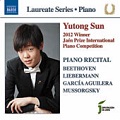 Yutong
Sun, born in 1995, recorded this as part of his prize for winning the
2012 Jaén Piano Competition. The standout here is his performance
of Lowell Liebermann’s Gargoyles, four short pieces of peculiar
and sometimes grotesque characters, befitting the title. Especially
noteworthy is #2, a haunting adagio; you might compare it to
Debussy at his most harmonically complex. Yutong Sun gets this mood-piece
evoked perfectly.
Yutong
Sun, born in 1995, recorded this as part of his prize for winning the
2012 Jaén Piano Competition. The standout here is his performance
of Lowell Liebermann’s Gargoyles, four short pieces of peculiar
and sometimes grotesque characters, befitting the title. Especially
noteworthy is #2, a haunting adagio; you might compare it to
Debussy at his most harmonically complex. Yutong Sun gets this mood-piece
evoked perfectly.
Elsewhere things are less interesting. The Beethoven "Les adieux"
has a scintillating virtuoso finale, and that’s worth hearing if
you get a kick out of technical mastery at the highest level, but the
rest is merely average, expressively and dynamically middling. Juan
de Díos García Aguilera composed a short work, Flores
para Julia, for the competition, but I found it drab and unrewarding
("flores" means flowers, not dishwater). The Mussorgsky pictures
are more inhibited than those of another young hotshot virtuoso pianist
seeking to prove his mettle: Alfred Brendel on Vox in 1955.
The Liebermann is a discovery well worth your time, but the rest you
can take or leave. I downloaded MP3 (320 kbps) from ClassicsOnline,
which also provided album cover and PDF booklet. Recorded sound is close
enough you can sometimes hear what might well be sleeves swishing against
keys.
Sergei PROKOFIEV (1891-1953) Symphony No. 1, "Classical"
[15:08]
Giovanni BOTTESINI (1821-1889) Double Bass Concerto No. 2 [19:36]
Hugo WOLF (1860-1903) Italian Serenade [8:34]
Franz SCHUBERT (1797-1828) Symphony No. 2 [29:52]
Joseph Conyers (double bass)
Chamber Orchestra of Philadelphia/Michael Stern – rec. 27-28 January,
2013, Kimmel Center for Performing Arts, Philadelphia
CHAMBER ORCHESTRA OF PHILADELPHIA COP014 [73:10] – from
classicsonline.com
(mp3) or prestoclassical.co.uk (mp3 and lossless) or stream from Naxos
Music Library
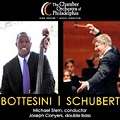 The
Chamber Orchestra of Philadelphia recently began posting recordings
of its live concerts on ClassicsOnline
(MP3 320 kbps) and Presto
Classical (FLAC); this is one of the best releases so far. Michael
Stern, the capable conductor of the Kansas City Symphony, joins the
orchestra for a delightful program centering on Giovanni Bottesini’s
second concerto for the double bass. It’s a lyrical work in the
Paganini tradition, the first big melody of which sounds an awful lot
like a tune from Mahler’s Third (played by the orchestra during
"O Mensch"). Joseph Conyers, double bassist for the Philadelphia
Orchestra, is a very fine soloist (and gets a long cadenza to prove
it).
The
Chamber Orchestra of Philadelphia recently began posting recordings
of its live concerts on ClassicsOnline
(MP3 320 kbps) and Presto
Classical (FLAC); this is one of the best releases so far. Michael
Stern, the capable conductor of the Kansas City Symphony, joins the
orchestra for a delightful program centering on Giovanni Bottesini’s
second concerto for the double bass. It’s a lyrical work in the
Paganini tradition, the first big melody of which sounds an awful lot
like a tune from Mahler’s Third (played by the orchestra during
"O Mensch"). Joseph Conyers, double bassist for the Philadelphia
Orchestra, is a very fine soloist (and gets a long cadenza to prove
it).
Surrounding this are charming performances of Prokofiev’s First
Symphony (a bit slow in the first movement but perfect everywhere else),
Wolf’s Italian Serenade, and Schubert’s Second Symphony.
The ensemble plays very well under Stern’s direction, and the live
recorded sound is good, not too dry and fairly cough-free though retaining
more applause than you’ll want to hear.
I’ll be reporting on more Chamber Orchestra of Philadelphia releases
from ClassicsOnline, but this is a good place for you to start getting
acquainted with a fine American ensemble.
[I’m grateful to Brian for pointing me in the direction of listening
via Naxos Music Library to an enjoyable recording which I probably would
not have considered otherwise. BW.]
My Polish Diary
Frédéric CHOPIN (1810-1849)
Variations brillantes (sur un thème de Hérold),
Op.12 [8:58]
Juliusz ZARęBSKI(1854-1885) Les Roses
et les Epines, Op.13 [20:25]
Karol SZYMANOWSKI (1882-1937) Masques, Op.34 [25:15]
Ignacy Jan PADEREWSKI (1860-1941) Humoresque de concert,
Op 14 [2:48]
Nocturne in B flat, Op.16/4 [4:00]
Witold LUTOSLAWSKI (1913-1994) Two Etudes [4:46]
Kiryl Keduk (piano) – rec. dates and locations unknown
Pdf booklet included
DELOS PRODUCTIONS DE3432 [66:15] – from classicsonline.com
(mp3) or stream from Naxos Music Library
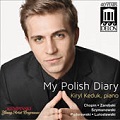 Pianist
Kiryl Keduk’s "Polish Diary" is an enjoyable tour of
Polish musical history. The Chopin opener is a little-known set of early
variations, which means that the most famous work here is actually Szymanowski’s
Masques. The Masques, knotty and devilishly playful as
they are, form a tough contrast to the salon pieces by Zarębski
and Paderewski. (The latter’s nocturne is especially pretty;
it’s a favourite encore of Stephen Hough’s.) Rounding out
the disc are two virtuosic études by a young Lutoslawski.
Pianist
Kiryl Keduk’s "Polish Diary" is an enjoyable tour of
Polish musical history. The Chopin opener is a little-known set of early
variations, which means that the most famous work here is actually Szymanowski’s
Masques. The Masques, knotty and devilishly playful as
they are, form a tough contrast to the salon pieces by Zarębski
and Paderewski. (The latter’s nocturne is especially pretty;
it’s a favourite encore of Stephen Hough’s.) Rounding out
the disc are two virtuosic études by a young Lutoslawski.
All in all, it’s the kind of smart program that makes the whole
more valuable than the sum of its parts; the charming Chopin does undercut
the slightly prosaic Zarębski works, but overall Keduk’s selections
make for an hour of contrasts, surprises, and rewards. That’s why,
though I might favour Piotr Anderszewski on Virgin Classics for the
Masques, I’ll be happy to return to this. Though the booklet
doesn’t mention when or where the CD was recorded, it does come
with excellent notes explaining the project, each work, and the backgrounds
of the less familiar composers.
Keduk, born in 1987, is from Belarus and has trained in Poland and Italy;
I hope we’ll be hearing more creative albums from him soon.
I downloaded MP3 (320 kbps) from ClassicsOnline, which also provided
album cover and PDF booklet.
Brian Reinhart
David Barker’s Reviews
The five recordings I have chosen this time all come from recent purchases
from The Classical Shop hourly or eclassical daily 50% discount. Therefore,
they are not all recent releases, as these offers come randomly from
their entire catalogue of each label.
Frederick MAY (1911-1985) String Quartet
Aloys FLEISCHMANN (1910-1992) Piano Quintet
Hugh Tinney (piano)
Vanbrugh String Quartet – rec. 1995
MARCO POLO 8.223888 (download from The
Classical Shop mp3 and lossless) or stream from Naxos Music Library
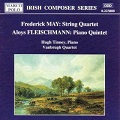 This
is the first offering from the label’s Irish Composers Series
that I’ve heard, and unfortunately I can’t give it a particularly
high rating.
This
is the first offering from the label’s Irish Composers Series
that I’ve heard, and unfortunately I can’t give it a particularly
high rating.
The May begins with two fast movements which are only memorable for
their lack of anything memorable. The first movement totally outstays
its welcome at almost thirteen minutes. The slow movement which completes
the work is a marked improvement, with Vaughan Williams, one of May’s
teachers, brought to mind, but unfortunately not enough to make up for
the first two. Colin
Scott-Sutherland was much more impressed by this work back in 1998
when it was first released.
The Fleischmann is better, the addition of the piano providing some
variety in tonal colour that the May lacked. It has a more conventional
structure in terms of the arrangement of the four movements, and there
is much to like in the gentle lyrical moments. Unfortunately, there
is a tendency across all four movements for the music to suddenly jump
from quiet reflection to intense activity and then back again, which
becomes a little wearing.
In principle, the track samples offered should prevent disappointment
– I’m not sure what happened here.
Alfred HILL (1869-1960) String Quartets 10 & 11
"Life" Quintet for piano, string quartet and voices
The Dominion Quartet
Richard Mapp (piano) – rec. 2009-11
NAXOS 8.572844 (download from The
Classical Shop, mp3 and lossless) or stream from Naxos Music Library
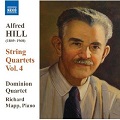 Now
this was a much better experience. The two quartets, both written in
1935, hark back to the previous century, and are really fine pieces
of music, particularly No.11. Its slow movement brings to mind the famous
Notturno from the second Borodin quartet, and indeed, it is in
the slower movements and episodes where Hill really shines.
Now
this was a much better experience. The two quartets, both written in
1935, hark back to the previous century, and are really fine pieces
of music, particularly No.11. Its slow movement brings to mind the famous
Notturno from the second Borodin quartet, and indeed, it is in
the slower movements and episodes where Hill really shines.
The quintet, a few decades earlier, is a lesser work, though the central
section of the third funeral march second movement is quite glorious.
The finale is a very odd concoction, probably unique in chamber music,
in that it includes a vocal ensemble. If you hadn’t read the track
list, it would be easy to assume that it was an entirely separate work,
so little connection does it have to the first three movements.
My only criticism of the performances mirrors that of William Kreindler
in his review:
the slow tempos adopted by the players don’t really match the markings.
The allegretto finale of Quartet 11 is closer to andante. Still,
we are very unlikely to get a better recording any time soon, which
in the case of Quartet 11, is a real shame.
A Celebration of Cellos
Works for cello ensemble by Rodrigo, Cervetto, Aeschbacher, Mainardi,
Dare, Don, Hewitt-Jones and Norris
Cello Spice – rec. 1995
DIVINE ART DDA25002 (download from The
Classical Shop, mp3 and lossless) or stream from Naxos Music Library
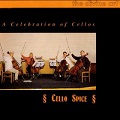 The
potential for a lack of variety in almost seventy minutes of works solely
for three or four cellos is considerable, particularly when only one
– the Cervetto Trio – is from other than the twentieth century.
Nevertheless, the members of Cello Spice, four eminent Scottish cellists
(fitting since this is a very early recording from the Scottish label)
have done a very good job in avoiding, in most part, this trap.
The
potential for a lack of variety in almost seventy minutes of works solely
for three or four cellos is considerable, particularly when only one
– the Cervetto Trio – is from other than the twentieth century.
Nevertheless, the members of Cello Spice, four eminent Scottish cellists
(fitting since this is a very early recording from the Scottish label)
have done a very good job in avoiding, in most part, this trap.
I admit to only having heard of Rodrigo beforehand, but that didn’t
prevent me from greatly enjoying the works of the others. The Mainardi
Notturno is breathtakingly beautiful, and I particularly enjoyed
the Aeschbacher Suite, which dates from 1941, but harks back to an earlier
time. If your preference is for challenging works, then look elsewhere.
If, like me, you enjoy music that is tuneful, while maintaining harmonic
and rhythmic interest, then you should find this a good choice. Of course,
you do need to like the cello.
Carl STAMITZ (1745-1801) Symphonies
London Mozart Players/Matthias Bamert – rec. 1995
CHANDOS CHAN9358 (Download from The
Classical Shop, mp3 and lossless)
[see also review of an inexpensive 5-CD set CHAN10628 which contains
these symphonies plus music by Krommer, Pleyel, Kozeluch and Wranitzky
– September
2010 DL Roundup]
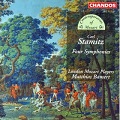 The
Classical Shop computer has been kind enough to alight a number of times
on the Contemporaries of Mozart series with its choice of hourly
discount. This is one of the earlier entries, but one that I had missed
when purchasing the CDs. Regardless of composer, all the music in this
series is enjoyable and well-performed, but none of it reaches the dizzying
heights of Mozart – hardly a surprise – and might be thought
of as fairly uniform and not distinctive. These four symphonies from
the younger Stamitz, from the fifty-plus he wrote for the Mannheim court,
strike me as being among the best I’ve heard in terms of their
melodic and rhythmic inventiveness.
The
Classical Shop computer has been kind enough to alight a number of times
on the Contemporaries of Mozart series with its choice of hourly
discount. This is one of the earlier entries, but one that I had missed
when purchasing the CDs. Regardless of composer, all the music in this
series is enjoyable and well-performed, but none of it reaches the dizzying
heights of Mozart – hardly a surprise – and might be thought
of as fairly uniform and not distinctive. These four symphonies from
the younger Stamitz, from the fifty-plus he wrote for the Mannheim court,
strike me as being among the best I’ve heard in terms of their
melodic and rhythmic inventiveness.
[Unfortunately, Chandos have deleted the desirable USB set of their
complete Contemporaries of Mozart series which I recommended,
but the 5-CD set mentioned at the head of this review remains available.
BW]
Eduard TUBIN (1905-1982) Symphony 1 [32:01]
Balalaika concerto [19:59]
Music for strings [15:15]
Swedish RSO/Neeme Jarvi – rec. 1987
Pdf booklet included.
BIS BIS-CD-351 (Download from Eclassical,
mp3 and lossless)
[Symphony No.1 also available on BIS-CD-1402/04, 5 CDs for price
of 3 – review
by Rob Barnett.]
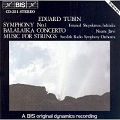 I
bought most of the Tubin/BIS series on CD, but not this one – I
suspect the presence of a balalaika concerto put me off. However, at
$5 on the daily discount at eclassical, I felt that I could hardly go
wrong, regardless of the qualities or otherwise of the aforementioned
work.
I
bought most of the Tubin/BIS series on CD, but not this one – I
suspect the presence of a balalaika concerto put me off. However, at
$5 on the daily discount at eclassical, I felt that I could hardly go
wrong, regardless of the qualities or otherwise of the aforementioned
work.
As it turned out, the Balalaika Concerto was certainly not dreadful,
just a bit underwhelming: not one of the Estonian’s finest moments.
However, the other works well and truly compensated. The First Symphony
is a fine work, full of grand gestures and striking melodies. The Music
for Strings is a later and consequently more austere work, but stands
up well against the great English works for strings.
David Barker











